




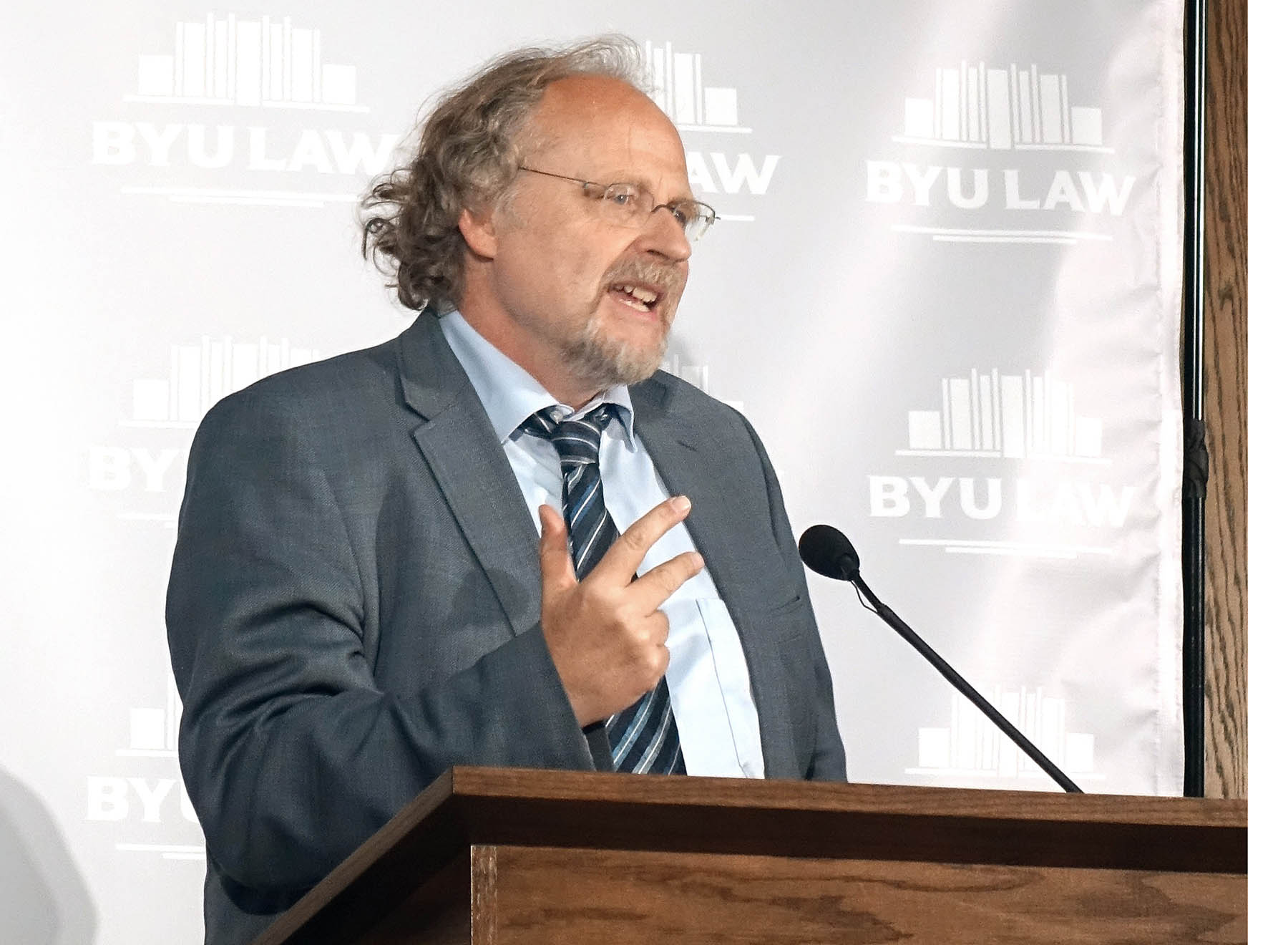
Heiner Bielefeldt; Photo by Page Johnson
by Blythe Shupe
The Keynote speaker for the 23rd Annual International Law and Religion Symposium was Heiner Bielefeldt, United Nations Special Rapporteur on Freedom of Religion or Belief. Professor Bielefeldt was also the recipient of the International Center for Law and Religion Studies Distinguished Service Award.
Professor Bielefeldt spoke of Freedom of Religion or Belief (FoRB)as a highly provocative right. It brings together human rights and religion. As a result, FoRB can be provocative to governments, religious communities, and societies.
While Article 18 of the Universal Declaration of Human Rights establishes the right to freedom of thought and religion, it is a challenge for some governments. The state may attempt to define legitimate religious options, require religions... more
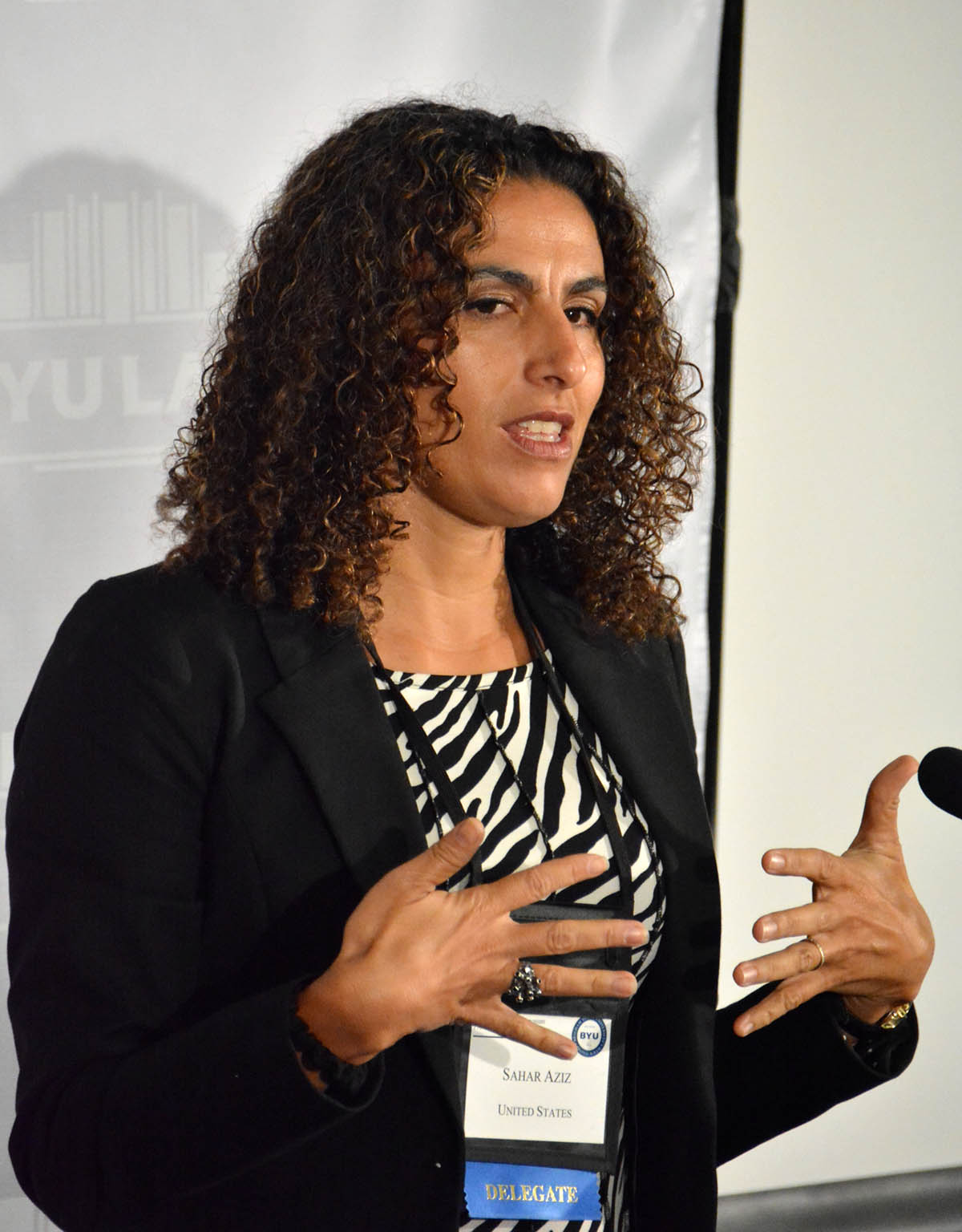
Professor Sahar Aziz; Photo Credit: Brent Belnap
by Alexander Alton
The topic of the first plenary session of the 23rd Annual International Law and Religion Symposium was Religious Rights and Cultures. Elizabeth Clark, Associate Director of the International Center for Law and Religion Studies, moderated the session. The panel featured Rajeev Bhargava, Senior Fellow and former director of the Centre for the Study of Developing Societies; Sahar F. Aziz, Professor of Law at Texas A&M School of Law and a Nonresident Fellow at the Brookings Doha Center in Qatar; and Simon Gerard McCrossan, Barrister and Head of Public Policy for the Evangelical Alliance in the United Kingdom.
Professor Bhargava lectured about different types of diversity, namely diversity within religious groups (vertical diversity), diversity of religious groups with similar theological backgrounds (horizontal diversity), and diversity of religious groups with different theological backgrounds (deep diversity). He taught that when we are really serious about diversity, we are tolerant when the norms and requirements of others’ religions conflict with the norms... more
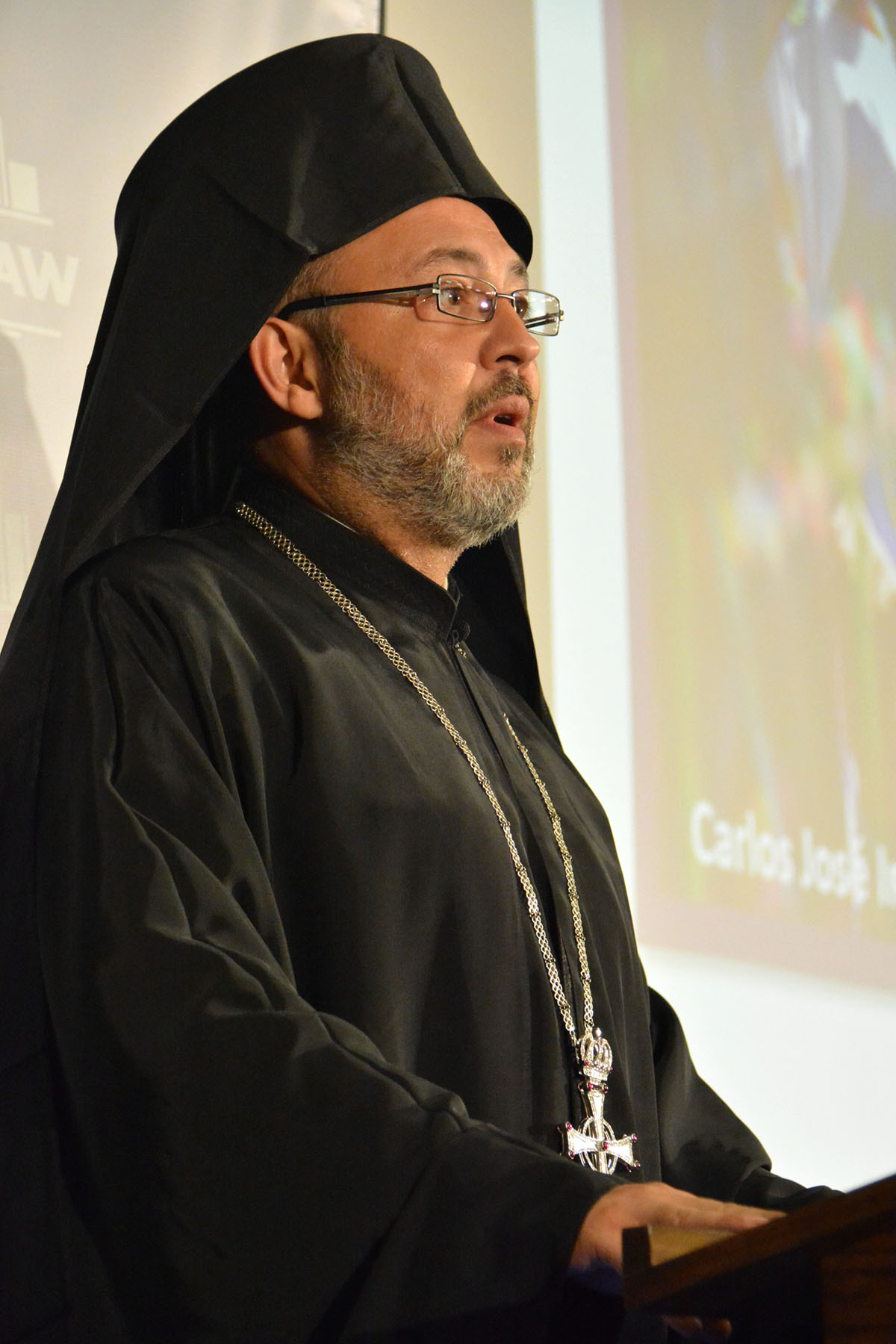
Father Aimilianos Bogiannou; Photo credit: Brent Belnap
By Gaylee Coverston
In the Second Plenary Session: Minorities, Majorities and Religious Rights, Gary B. Doxey, Associate Director of the International Center for Law and Religion Studies, acted as Moderator. He began the session by ceding time to Tassaduq Hussain Jillani, Former Chief Justice of Pakistan, who then presented his paper on “The Interplay of Majority and Minority Rights and the Role of Judiciary.” He mentioned that the declared commitment of the international community to promote the protection of universal human rights is seen through cooperation and collaboration of various entities of economic, political, scientific, and research interests. Fear of government imposed religion prompted those creating the United States Constitution to include the establishment clause where government cannot impose a religion on the populous. This began the establishment of religious freedom and became the example for democratic nations. The concern for the protection of religious rights and minorities reached global recognition and required a global judicial response rights after World War II in response to the atrocities of the Holocaust resulting in the UN Declaration of Human rights. Nations realized that peace would be illusive until tolerance became the norm. Good... more
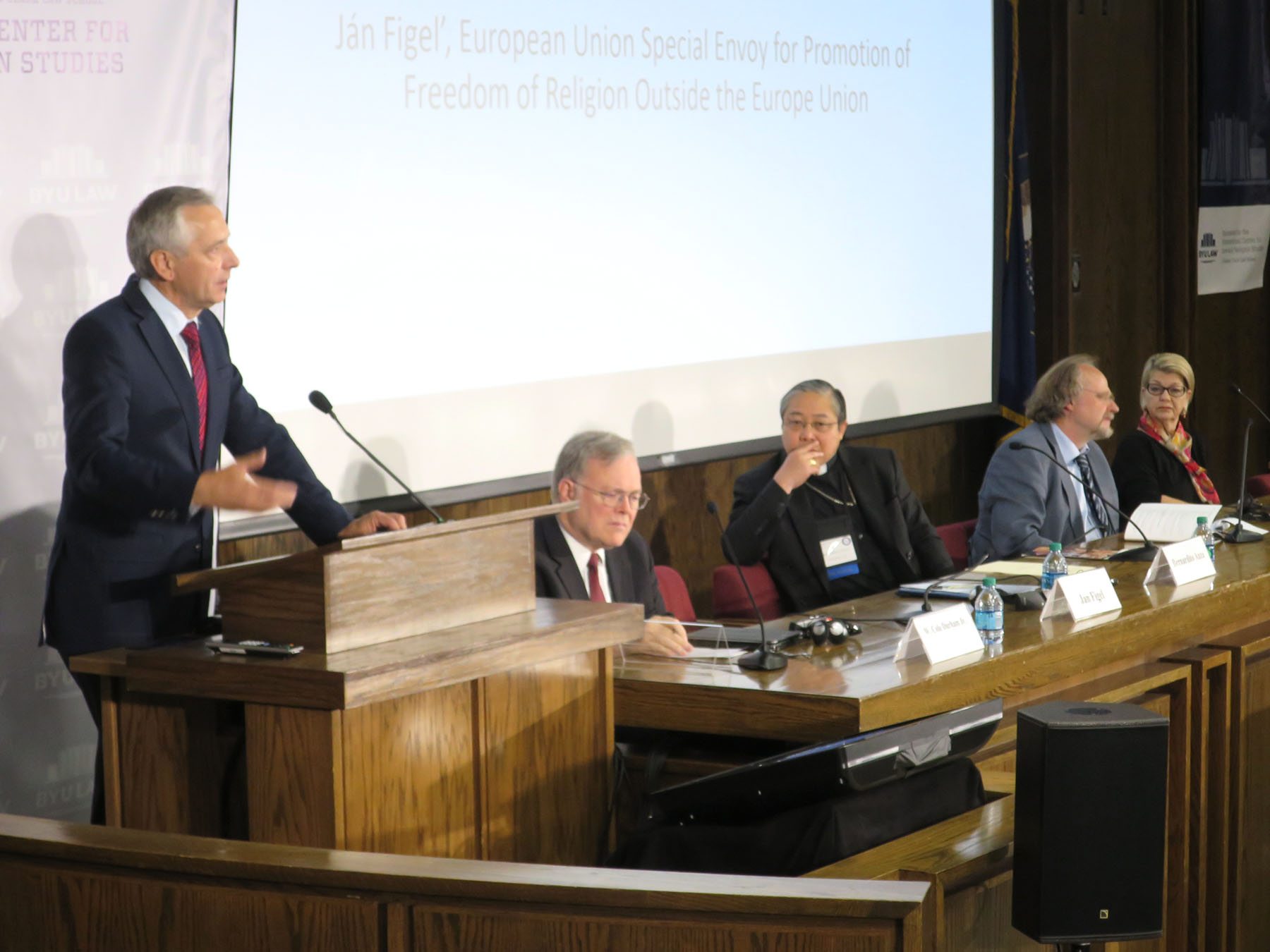
by Jordan Pendergrass
Ján Figel’, Special Envoy for the Promotion of Freedom of Religion or Belief Outside the European Union, opened the Third Plenary Session of the symposium. His remarks were entitled “Religious Freedom and Century of Genocides.” He first reviewed the primary international covenants relating to religious freedom, and then explained the prominence of the human right of religious freedom. Mr. Figel’ explained that religious freedom is the litmus test of all rights, and that there are no real civil rights without religious freedom. Religious freedom, he explained, is not extra, but rather is core and based in the first value: human dignity. Mr. Figel’ discussed his role as the first Special Envoy. Not surprisingly, he expressed his hope that there is a rich succession of envoys in the future. He made clear the fact that his nomination was not aimed at helping only Christians and stated that “my role is to help all.” Regarding the pressing issue of genocide, he mentioned how 70 years have passed since the Nuremberg Trials, but the mantra of “never again” remains an incomplete vision. He described the various... more
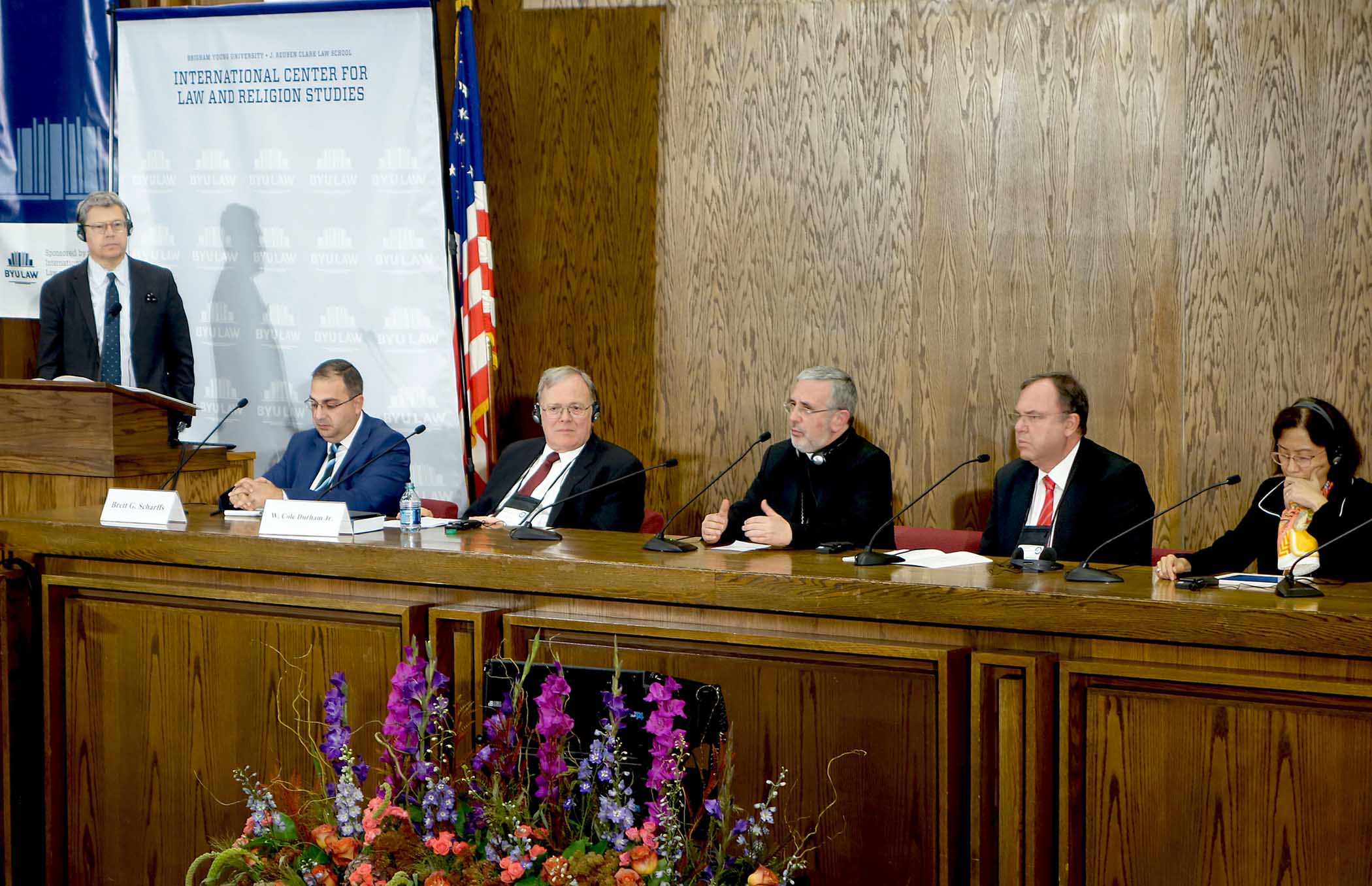
Photo credit: Page Johnson
by Blythe Shupe
The fourth and final plenary session of the 23rd Annual International Law and Religion Symposium included an address by Brett Scharffs, Director of the International Center for Law and Religion Studies, comments from some of the delegates, and closing remarks from W. Cole Durham, Jr., Founding Director of the International Center for Law and Religion Studies
Brett Scharffs opened the session by thanking the students, the Center Management Board, the hosts, performing groups, interpreters, staff, delegates, and all that participated. He thanked all for “sharing in a spirit of good will and a desire to understand and listen and work together.”
Professor Scharffs began his presentation by asking, “Is religious freedom the grandfather of human rights or the neglected step child? As with most false dichotomies, the answer is both. In addition to being these, it is the underappreciated core of human rights.” He proceeded to speak about why we... more
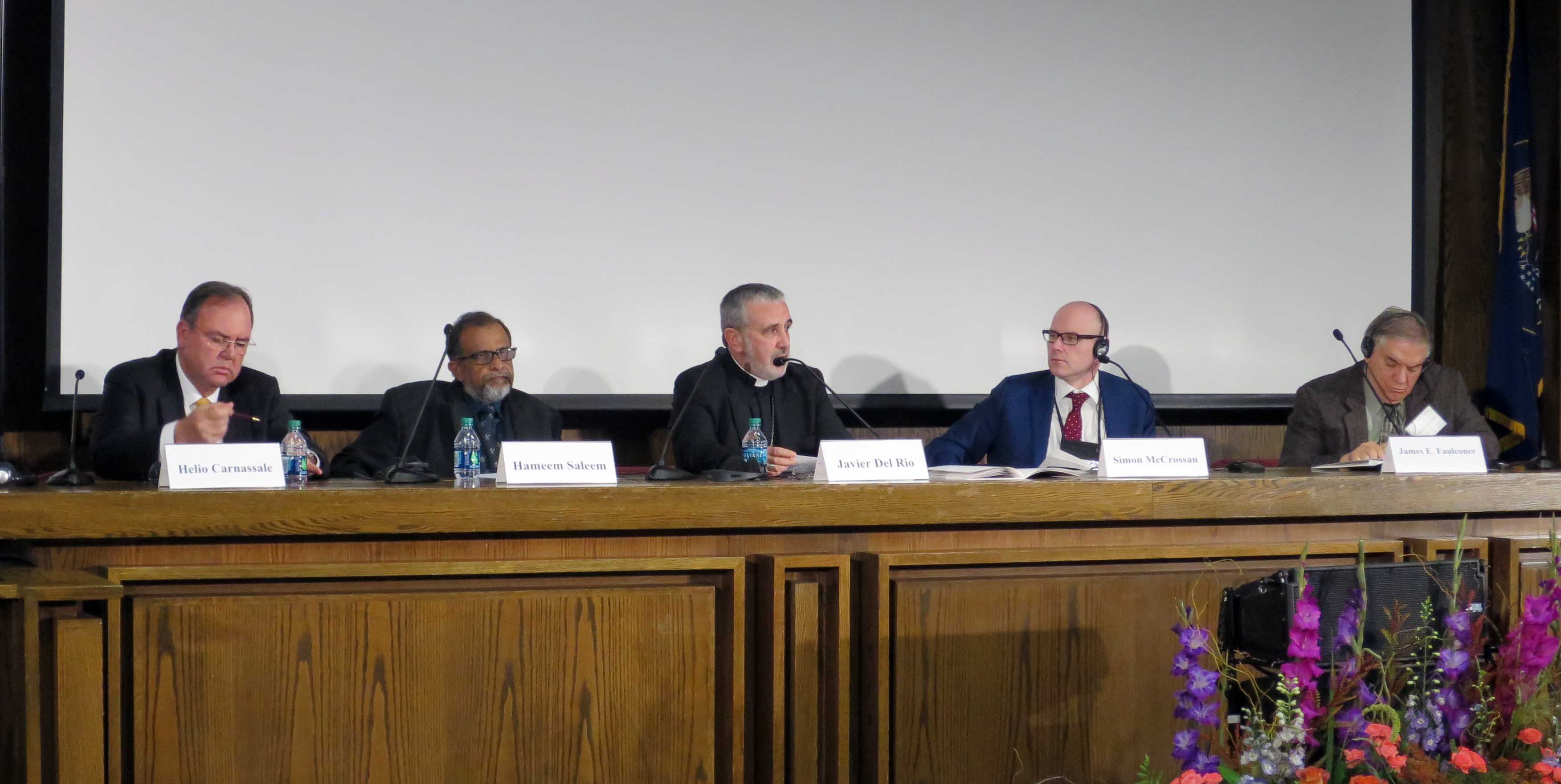
by Alexander Alton
The breakout session on Interreligious Cooperation, Religious Rights, and Pluralism was held on Monday, October 3, 2016 and moderated by James Faulconer, Professor of Philosophy and Richard L. Evans Chair of Religious Understanding at Brigham Young University. The panel featured Archbishop Javier Augusto Del Río of Arequipa, Peru; Vice-President –I Hameem Mohamed Saleem of Jamiyah, Singapore; Simon McCrossan, Barrister and Head of Public Policy at the Evangelical Alliance in the United Kingdom; and Hélio Carnassale, Director of Public Affairs and Religious Liberty for the South American Division of the Seventh-day Adventist Church.
... more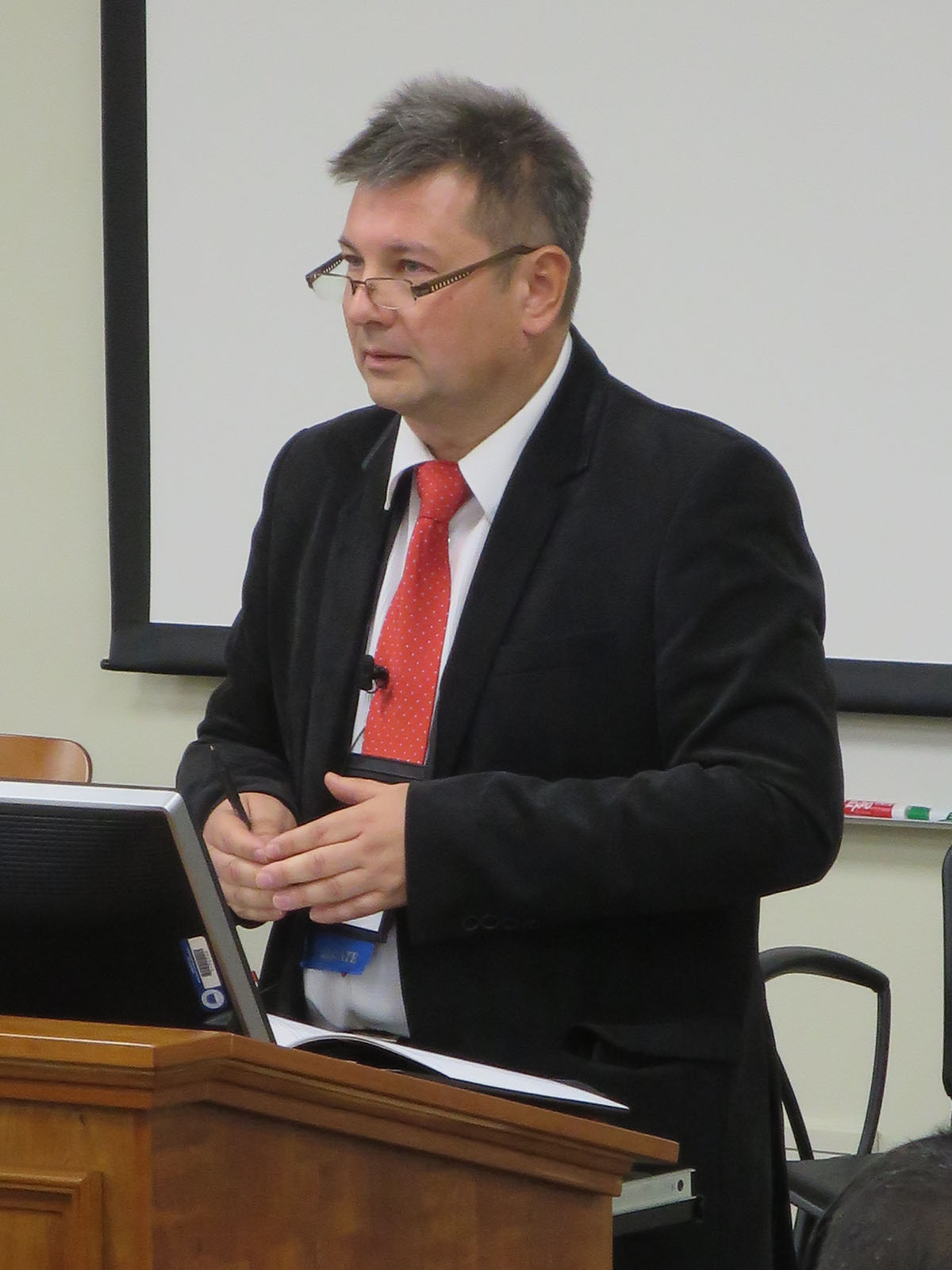
Andrey Lymar
by Ryan Hughes
In a session moderated by Justin Collings, an Associate Professor at the J. Reuben Clark Law School, Jaime Rossell Granados, from Spain, Paulo Soares Mendes Pinto, from Portugal, Andrey Lymar, from Poland, and Tore Lindholm, from Norway, discussed the current debates and development of religious rights in Europe.
Jaime Rossell Granados, the Deputy Director General for Religious Affairs at the Ministry for Justice in Spain, discussed how Spain has been working to protect religious freedom for all organizations and individuals. He described the three institutions that Spain has established to protect these liberties – the Registry of Religious Entities, the Religious Freedom Advisory Committee, and the Foundation for Pluralism and Coexistence. He also detailed the process for signing agreements between religious confessions and the state in order to guarantee liberties such as tax exemptions, slaughtering animals in a proscribed way, or marriage and burial methods.... more
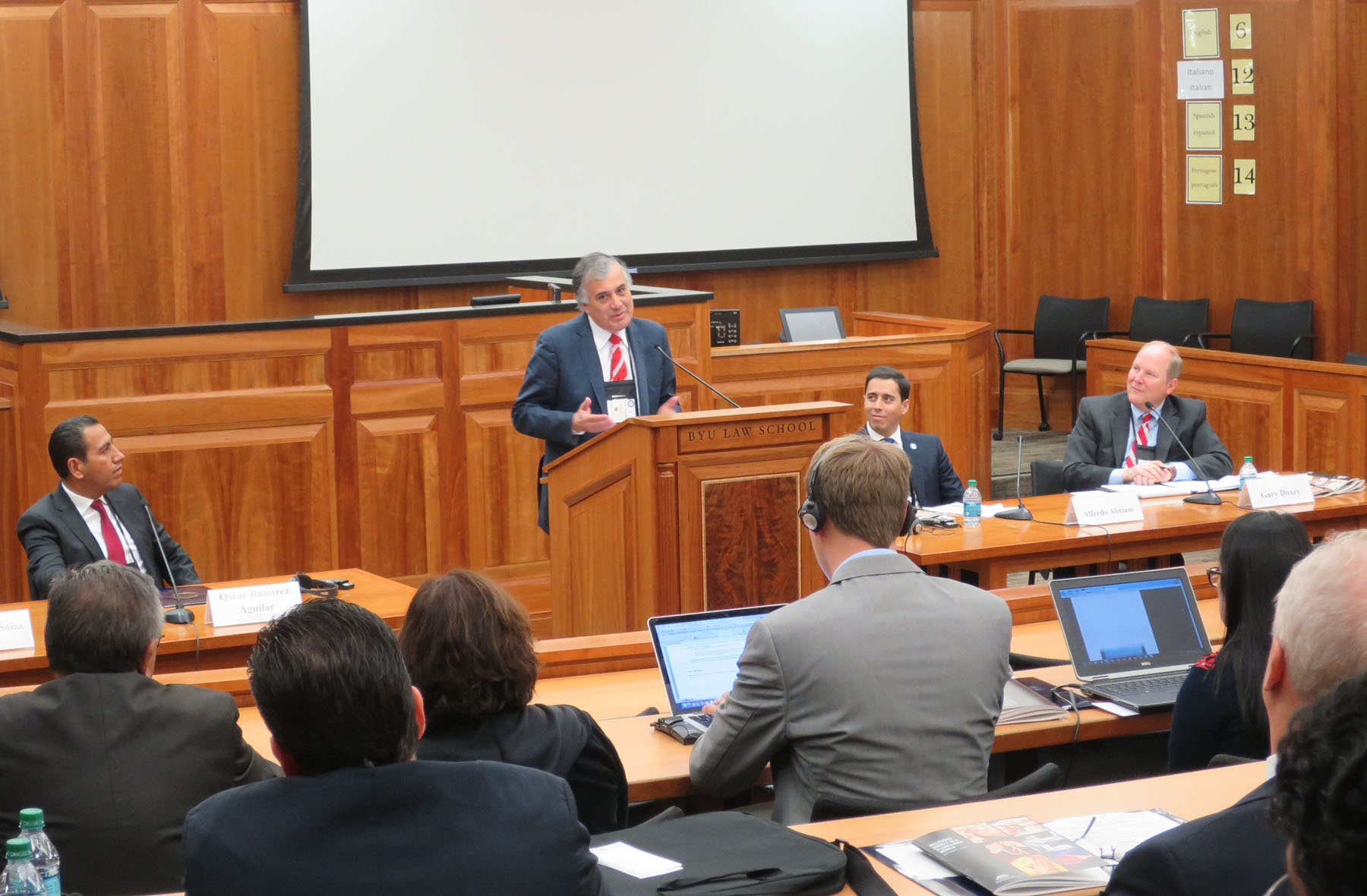
by Tanner Bean
The Latin America: Government Officials breakout session held on Monday, October 3, 2016 was moderated by Gary Doxey of the International Center for Law and Religion Studies. It included panelists Jorge Tapia Sainz, Oscar Ramirez Aguilar, and Alfredo Miguel Abriani.
Alfredo Miguel Abriani is the National Undersecretary for Worship, Ministry of Foreign Affairs and Worship of Argentina. He focused his remarks on the unique circumstances of religious liberty in Argentina. Abriani stated that generally, religious liberties thrive in Argentina, although there... more
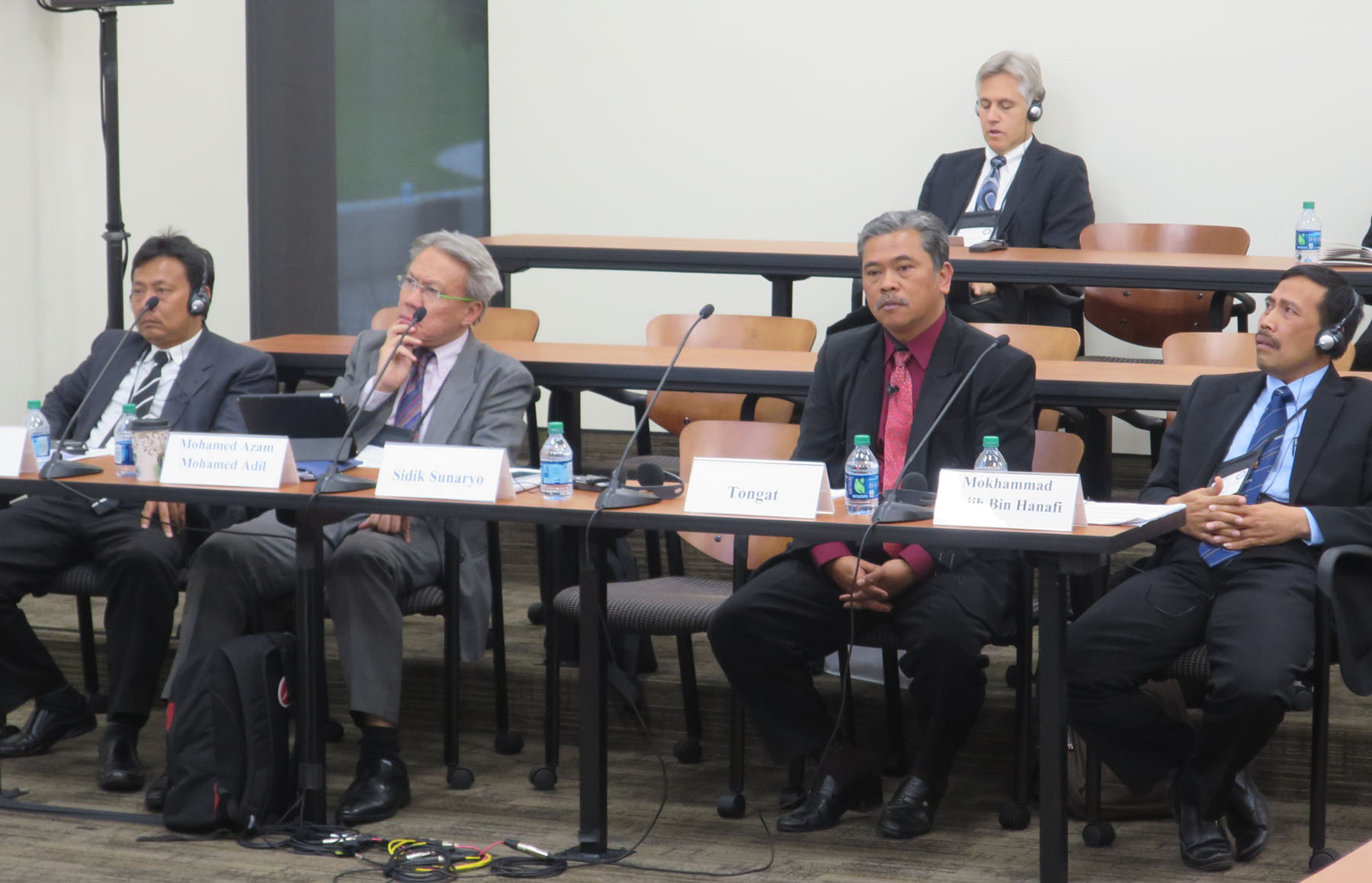
by Michael Goodrich
Professor Brett G. Scharffs, Director of the International Center for Law and Religion Studies, moderated the Malaysia and Indonesia session. Panelists were Mohamed Azam Mohamed Adil, Associate Professor, International Institute of Advanced Islamic Studies, Malaysia, Sidik Sunaryo, Lecturer and Former Dean, University of Muhammadiyah Malang, Indonesia, Tongat, Faculty of Law, Muhammadiyah University Malang, Indonesia, Mokhammad Najih Bin Hanafi, Lecturer, Faculty of Law, University Muhammadiyah Malang, Indonesia, and Khozin, Lecturer, University of... more
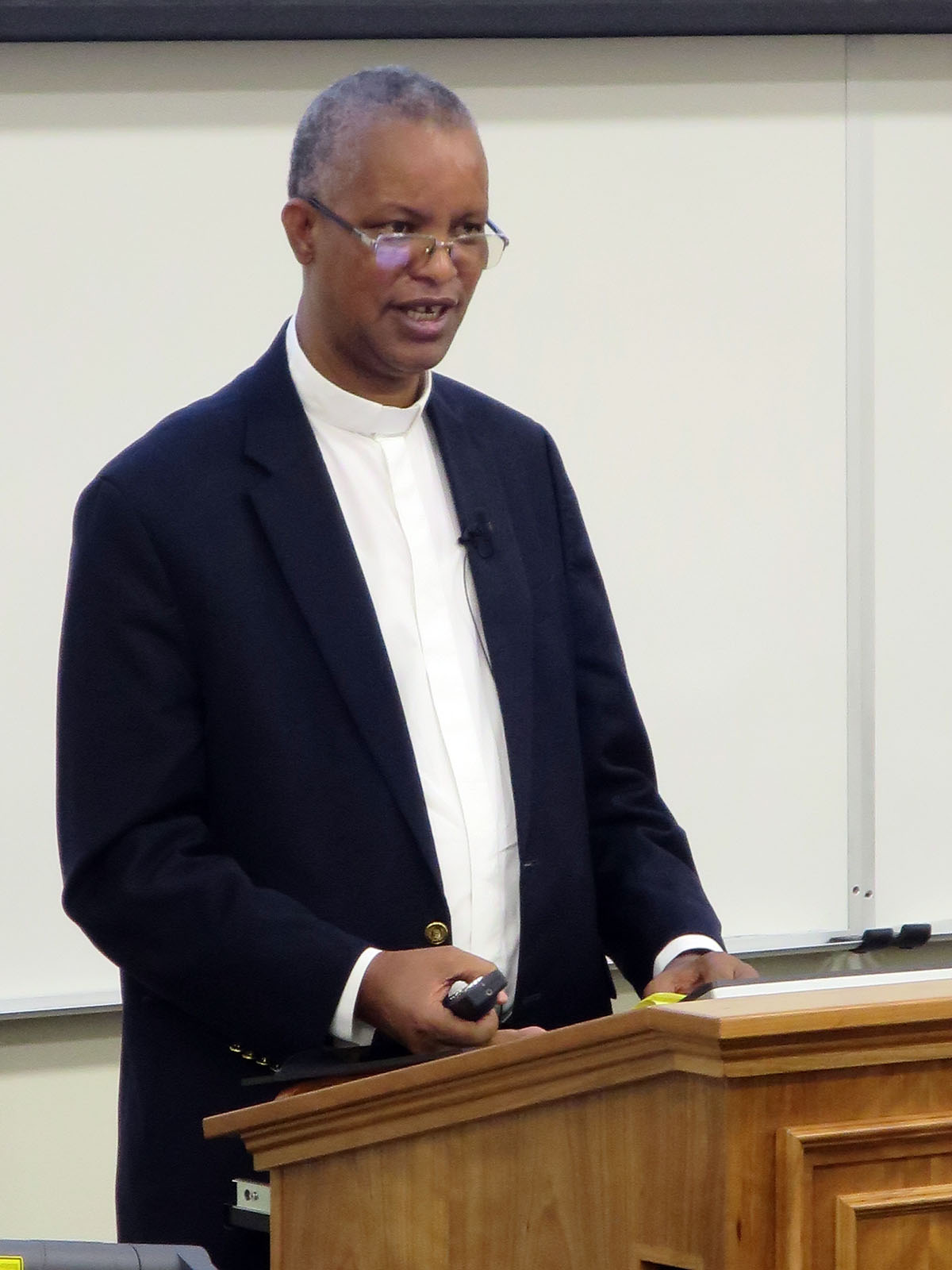
Herménégilde Ndoricimpa
by Jeremy Driggs
The session on Burundi and Ethiopia was chaired by Chantal Thompson, Teaching Professor of French, Brigham Young University, and panelists were Zenebe Beyene, Director, Office of External Relations, Partnerships and Communications, Addis Ababa University, Ethiopia, Herménégilde Ndoricimpa, Chancellor, University of Great Lakes, Burundi, and Solomon Fikre Lemma, Dean, College of Law and Governance Studies, Addis Ababa University, Ethiopia
Zenebe Beyene of Ethiopia spoke on inter-religious cooperation, religious pluralism, and inter-religious rights. He opened by discussing challenges that are common to all people, regardless of inherent differences. Religion, according to him, is a cover-up or a tool behind many conflicts. He talked about how ethnic religions are practiced in Ethiopia. He also talked about the variety of religions practiced there, from Islam to Rastafarianism. In spite of the differences in these religions, they all place major emphasis... more
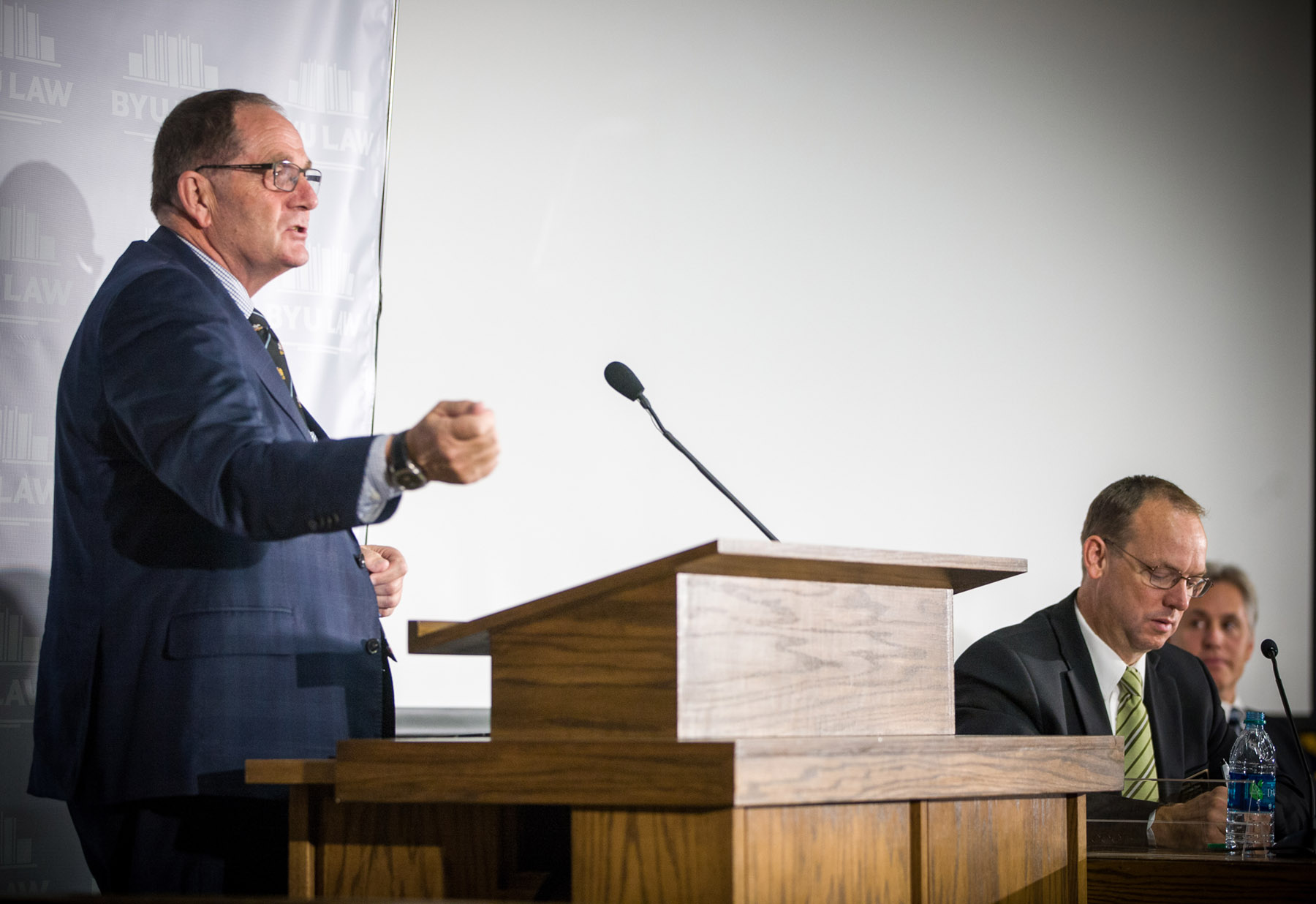
Chester Borrows; Photo credit: Matt Imbler
by Tanner Bean
The Canada and New Zealand breakout session held on Monday, October 3, 2016 was moderated by David H. Moore, Associate Dean of Research and Academic Affairs of the J. Reuben Clark Law School at Brigham Young University. The session featured panelists John Joseph Borrows and Chester James Borrows.
John Joseph Borrows is a distinguished Canadian scholar and Canada Research Chair in Indigenous Law at the University of Victoria Law School. During his presentation, he explained the wrongs committed against the indigenous peoples of Canada. Specifically, Borrows spoke of the program of Canadian Residential Schools—schools intentionally designed to remove indigenous children... more
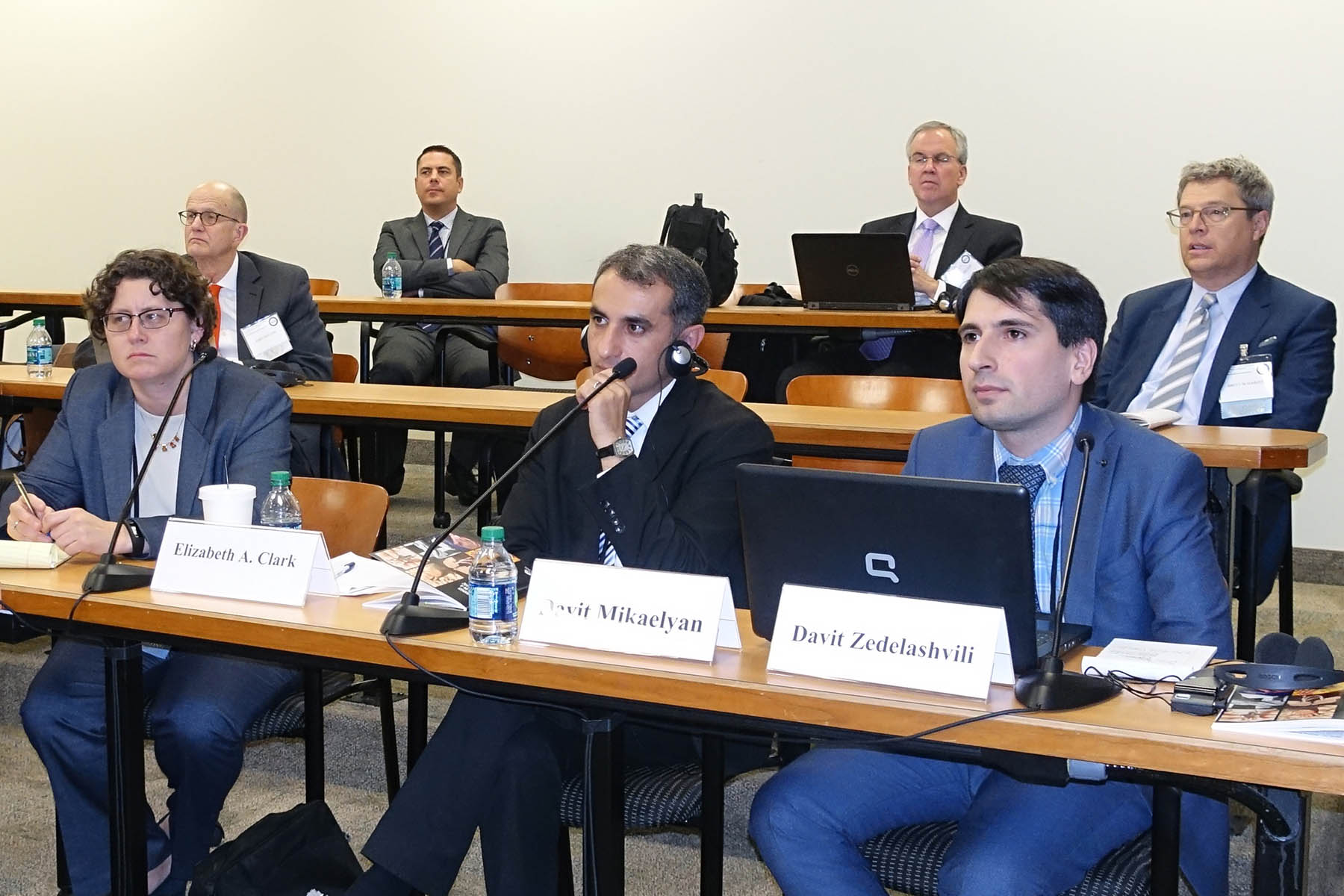
by Page Johnson
Professor Elizabeth Clark, Associate Director of the International Center for Law and Religion Studies, moderated the session on Georgia and Armenia. Panelists were Davit Mikaelyan, Chief Specialist, Division of National Minorities and Religious Affairs, Government Staff of the Republic of Armenia, and Davit Zedelashvili, Assistant Professor, Free University of Tbilisi; and Head Researcher, National Institute for Human Rights, Free University of Tbilisi, Georgia.
Delegate Davit Mikayelyan discussed the religious situation in Armenia by 1) emphasizing Armenian constitutional rights and 2) detailing some of the procedural requirements to obtain legal status for religious groups.
In contrast to the secular Soviet era with its negative attitude towards religion, he said... more
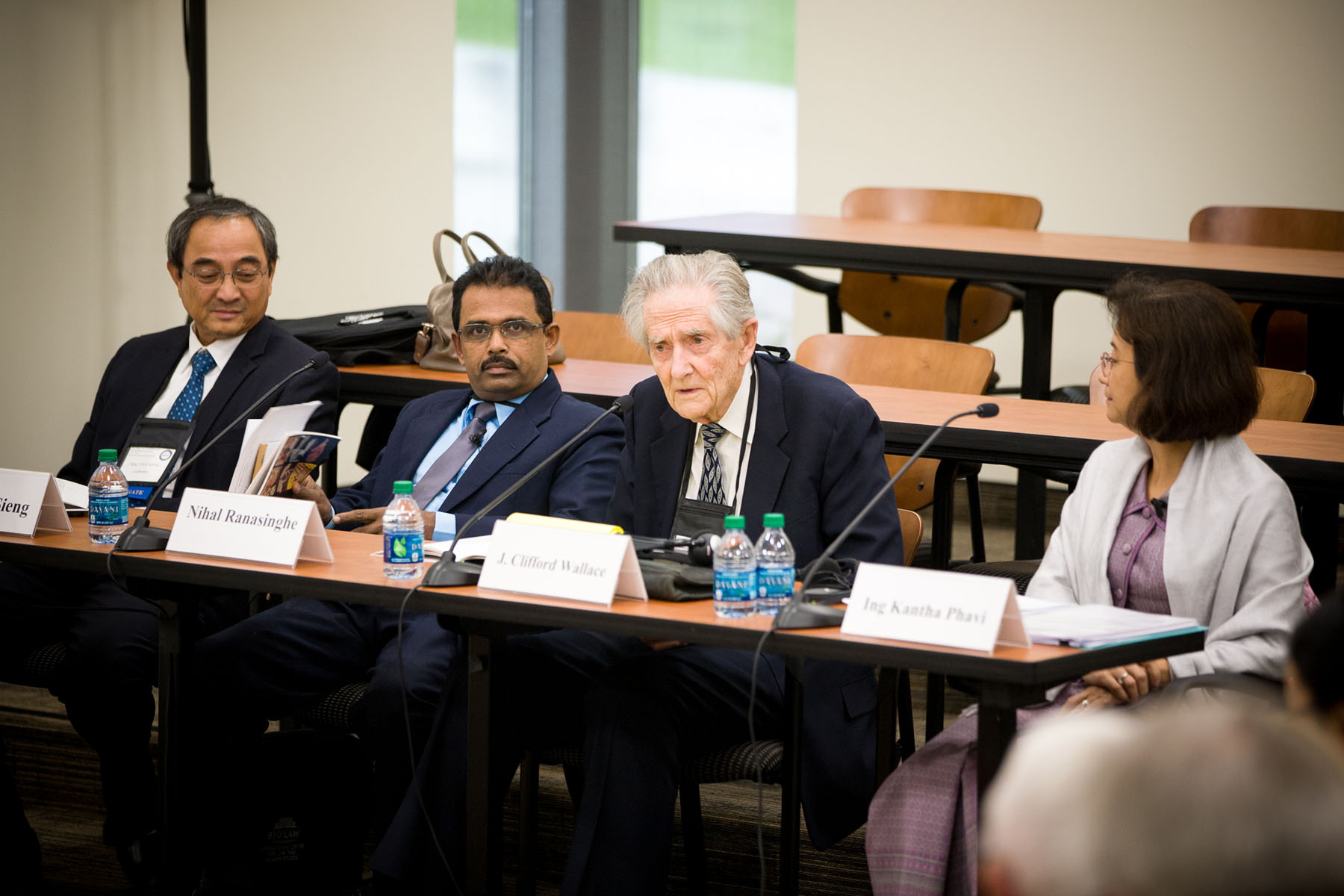
by Sandy Stephenson
J. Clifford Wallace, Chief Judge Emeritus, U.S. Court of Appeals for the Ninth Circuit, moderated the session on Cambodia and Sri Lanka. Panelists were Ing Kantha Phavi, Minister of Women’s Affairs, Cambodia, Nihal Ranasinghe, Controller General of Immigration and Emigration, Department of Immigration and Emigration, Sri Lanka, and Thai Sieng Trac, Vice Governor of Phnom Penh, Cambodia.
Ing Kantha Phavi spoke on Preserving Women and Family Rights. She stated that the role of men and women has been changing in Cambodia. The extended family remains very important, especially with regard to financial support. It is common to have three generations living together under one roof. Minister Phavi works to promote the role of women in society and a culture of peace, as... more
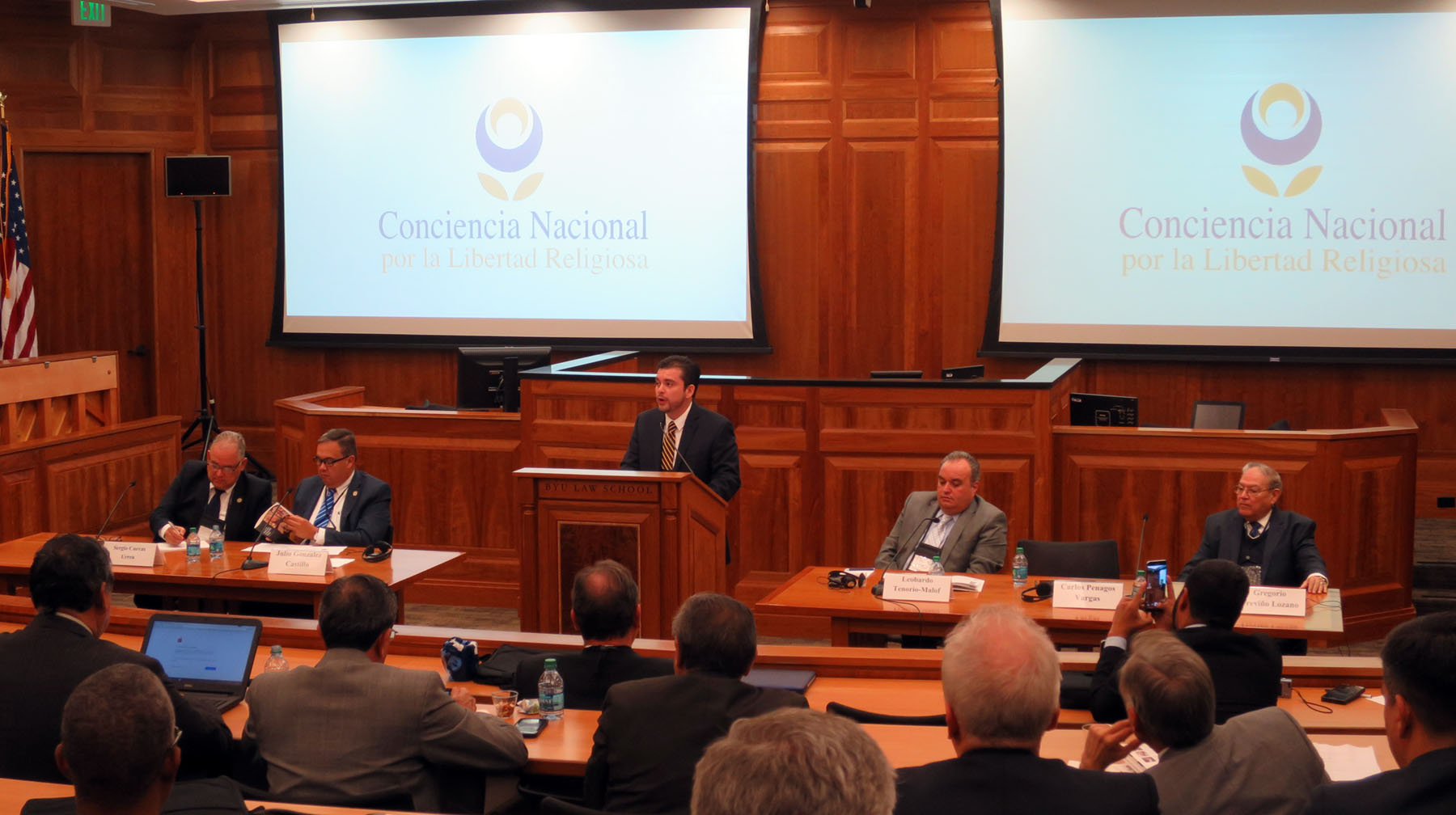
by Jordan Pendergrass
On the first full day of symposium events, a session was dedicated to Mexico. Speakers included Oscar Eduardo Ramírez Aguilar, President, Board of Directors, Congress of the State of Chiapas; Carlos Arturo Penagos Vargas, Member of Congress of the State of Chiapas; Sergio Cuevas Urrea, Vice President, Conciencia Nacional por la Libertad Religiosa; and Julio César González Castillo, Conciencia Nacional por la Libertad Religiosa. The session was moderated by Leobardo Tenorio-Malof, an attorney with the Professional Legal Alliance in Mexico.
Mr. Ramírez spoke about human rights in an international context, and described how they are based in inherent dignity of human beings. He identified three principal international documents that are... more
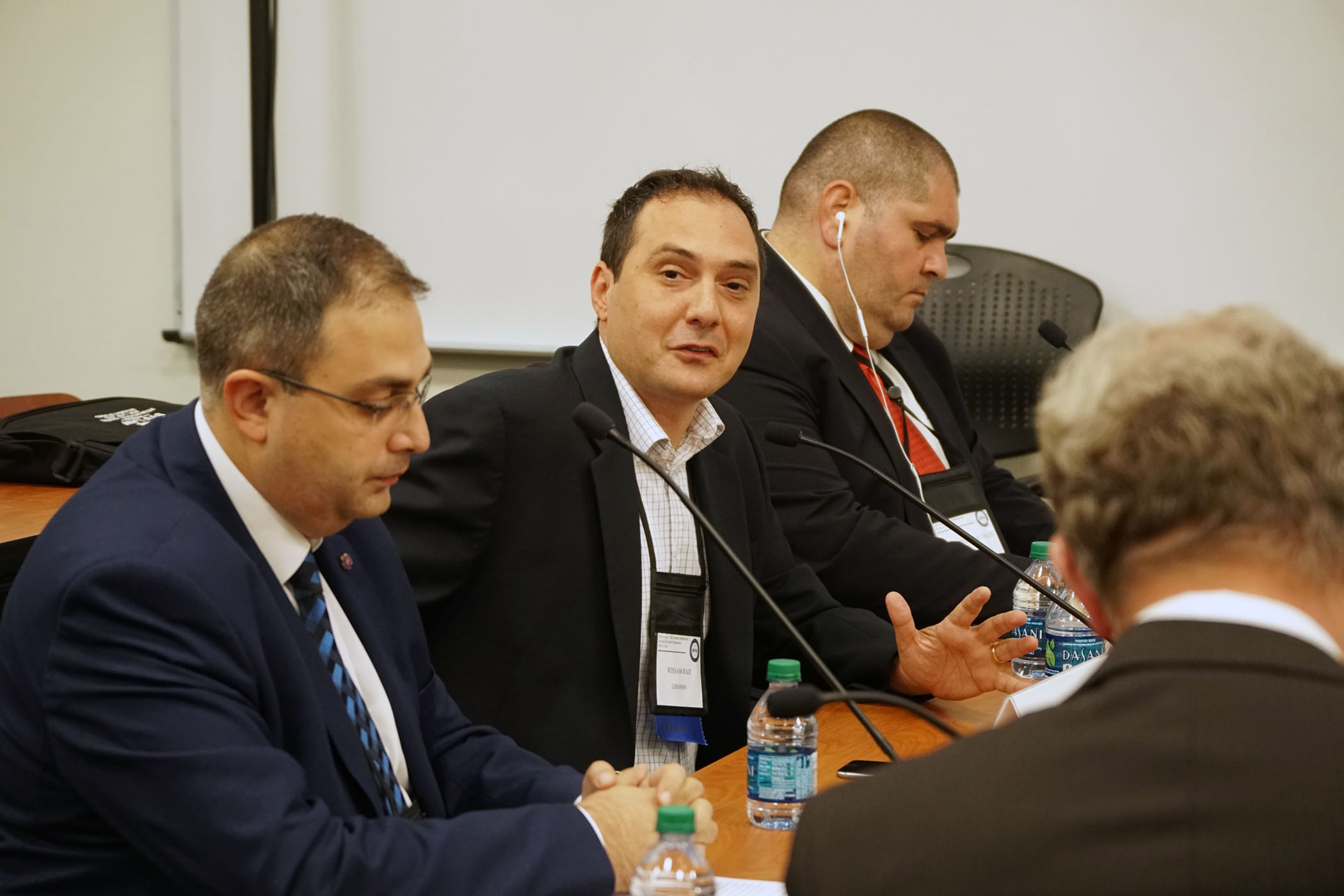
Photo credit: Matt Imbler
by Ryan Hughes
In a session moderated by David W. Kirkham, Academic Director for the Brigham Young University London Centre and Senior Fellow for the Comparative Law and International Policy at the International Center for Law and Religion Studies at the J. Reuben Clark Law School, Khalid Jamal Talya, from Iraq, Wissam Raji, from Lebanon, and Vladimir Vardanyan, from Armenia, discussed the various problems that are exacerbating religious conflict within the Middle East.
Khalid Jamal Talya, Director of General Christian Affairs at the Ministry of Endowments and Religious Affairs in Iraq, described the state of religious minorities such as Christians and Yazidis in Iraq and especially under the ISIS regime. He had a video of refugees and displaced persons playing silently in the background... more
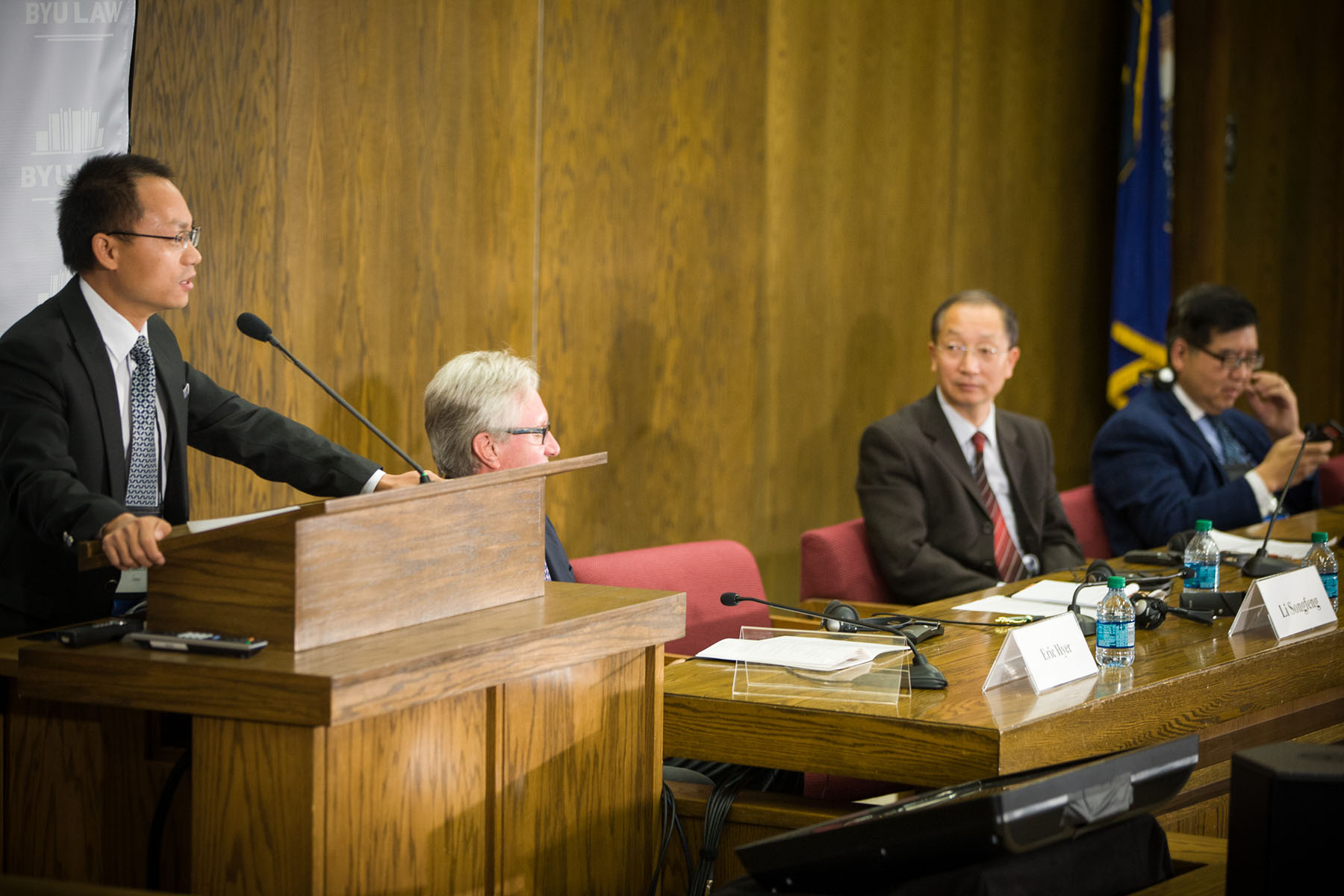
Photo credit: Matt Imbler
by Alexander Alton
The morning schedule on Tuesday, October 4, 2016 included a number of country updates. Eric Hyer, Associate Professor of Political Science and Coordinator for Asian Studies at Brigham Young University, moderated the session focused on China. The three presenters were Xu Yihua, a professor and the director of the Department of International Politics at Fudan University in Shanghai; Chen Jianming, a professor in the Institute of Religious Studies at Sichuan University; and Li Songfeng, a junior professor of law at the University of Politics and Law in Beijing.
Professor Jianming explained how communist ideology and atheism effect religious liberty in China. He suggested that, in China, an atheist philosophy that completely rejects the possibility of allowing others to have... more
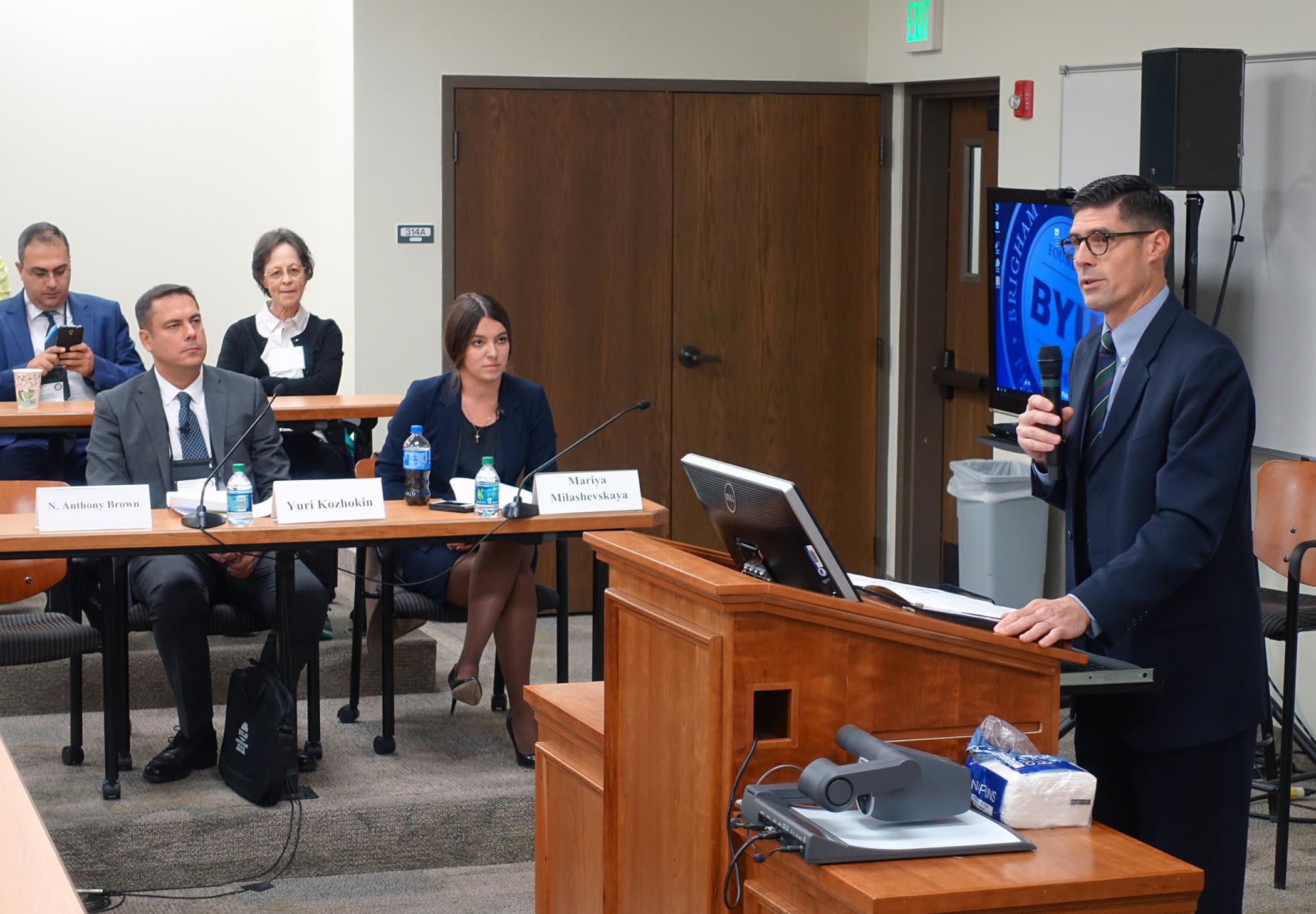
Photo credit: Page Johnson
The Belarus and Russia session was moderated by N. Anthony Brown, a professor of Russian at Brigham Young University. The panel featured two speakers, Yuri Kozhokin, an attorney at law, and Mariya Milashevskaya, a teacher at International University MITSO in Belarus.
Yuri Kozhokin spoke of the Yarovaya Act recently passed in the summer of 2016. He indicated that while religion is typically used as an umbrella, not a vehicle for violence, it can be a cover up for some to advance their interests. Thus the Russian government and legislators acted in a way to protect their citizens via the Yarovaya Act.
Prior to the Yarovaya Act, missionary... more
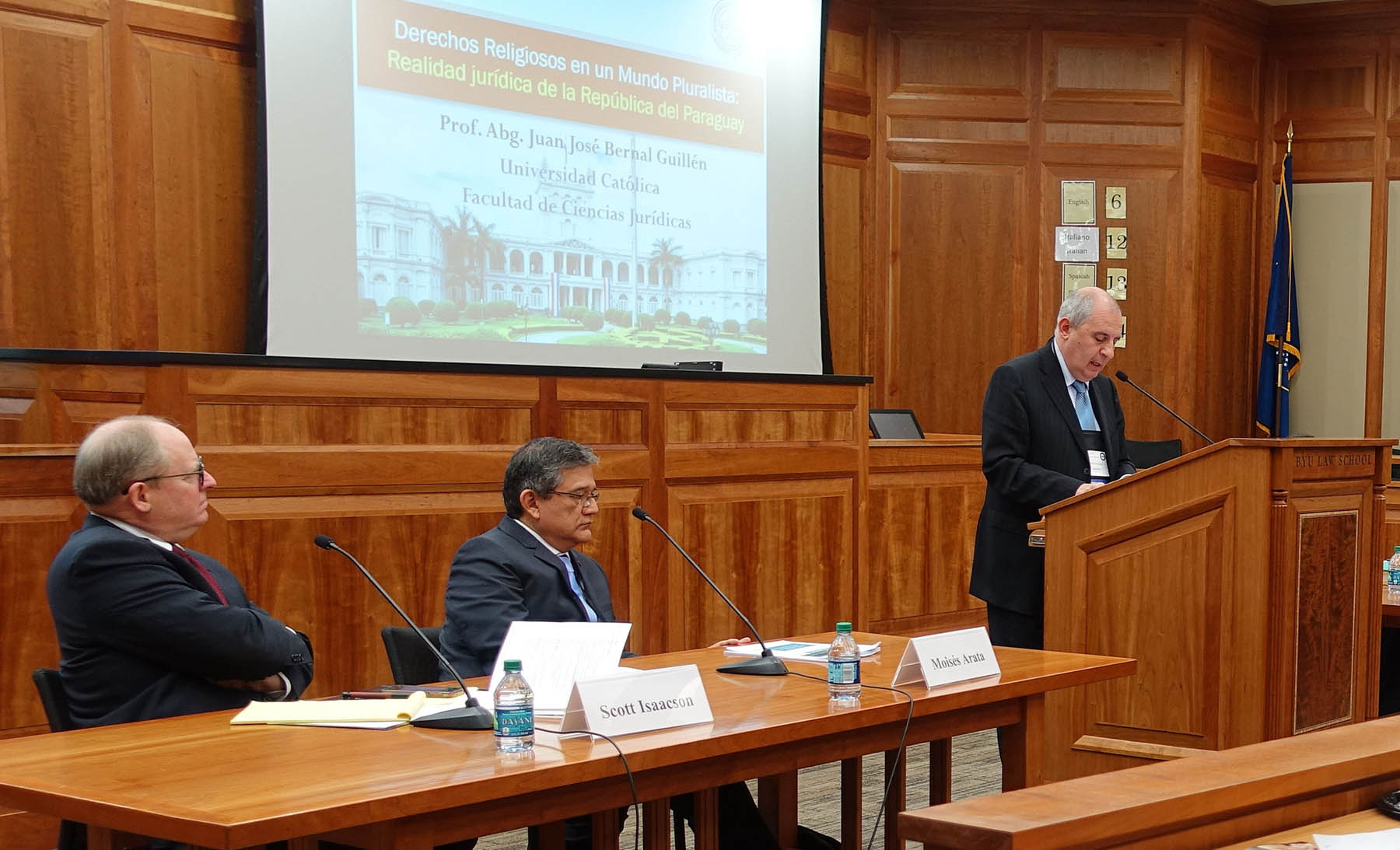
by Gaylee Coverston
In this session Scott E. Isaacson, Regional Advisor for Latin America for the International Center for Law and Religion Studies, acted as moderator. He introduced each of the delegates and presented the order in which they would speak.
The first presenter was Marco Gallo, Professor and Director of the Pontifical Chair at the Catholic University of Buenos Aires and specializes on interreligious dialogue and Islamic-Christian relations in particular. Professor Marco delineated the vision of Pope Francis regarding human rights and religious freedom. He agrees with a quote from Saint John Paul II, “the right to religious freedom, together with the right to life, is a fundamental point in the maintenance of a democratic country.” Pope Francis puts special emphasis... more
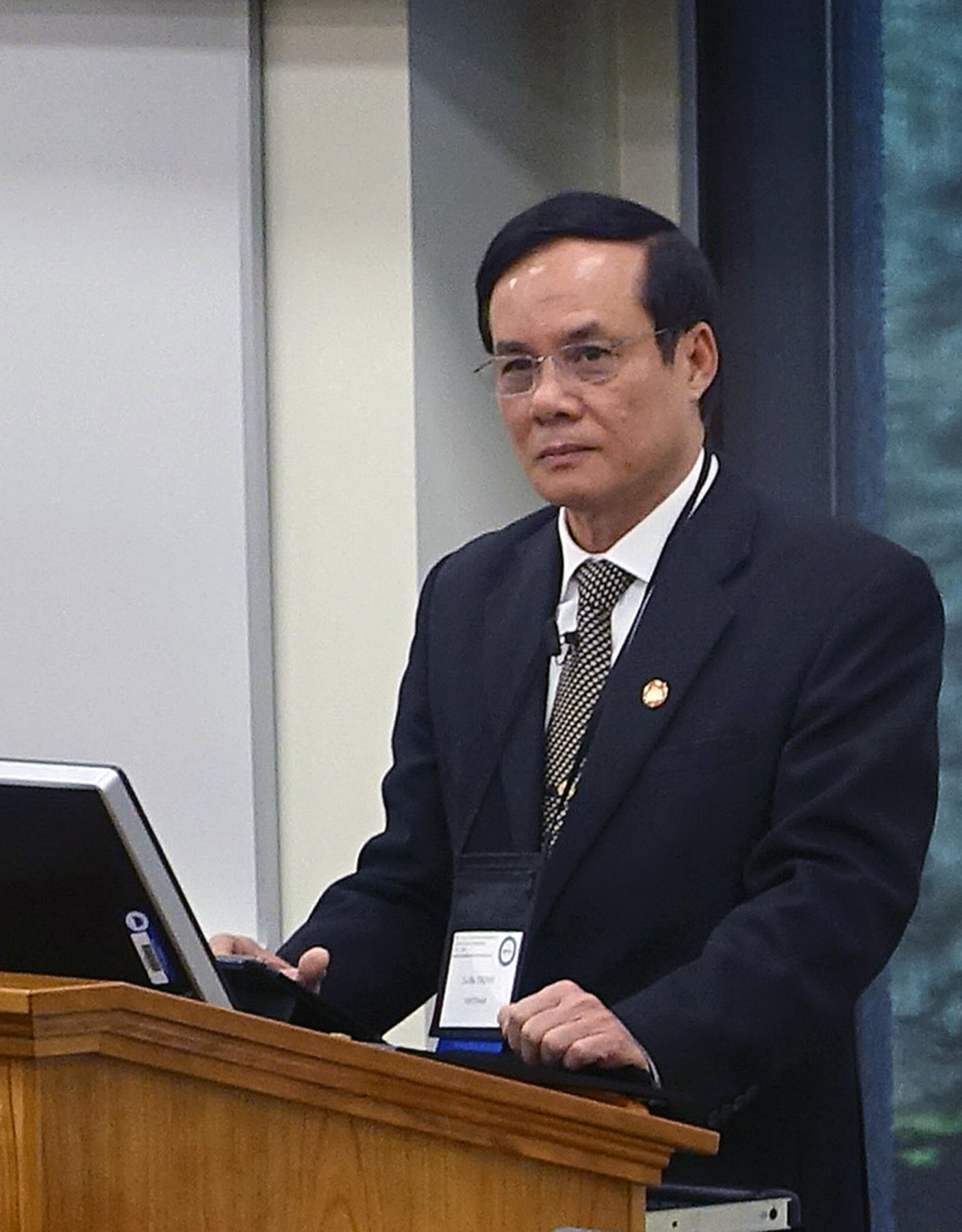
Dr. Le Ba Trinh, Photo credit: Page Johnson
by Richard Page
The Vietnam breakout session enjoyed the convergence of a distinguished panel of speakers and robust and lively collection of listeners. The session was moderated by Richard Page, International Fellow, International Center for Law and Religion Studies. The panel was led by Dr. Le Ba Trinh, Vice-Chairman of the Vietnam Fatherland Front, who described the history of constitutional and other regulatory treatment of religion and religious organizations. He summarized the steady progress in Vietnam of the protection and accommodation afforded religious freedom, highlighting (1) the explicit extension of such rights to foreigners in the Constitution of 2013 (such rights previously being textually tied to “citizenship”) and (2) a series of improvements reflected in the draft law on religion currently being considered by the government. These improvements include a movement toward a “notification” approach and away from an “approval” approach to regulation and a substantial streamlining of registration and other procedures. The two other speakers... more
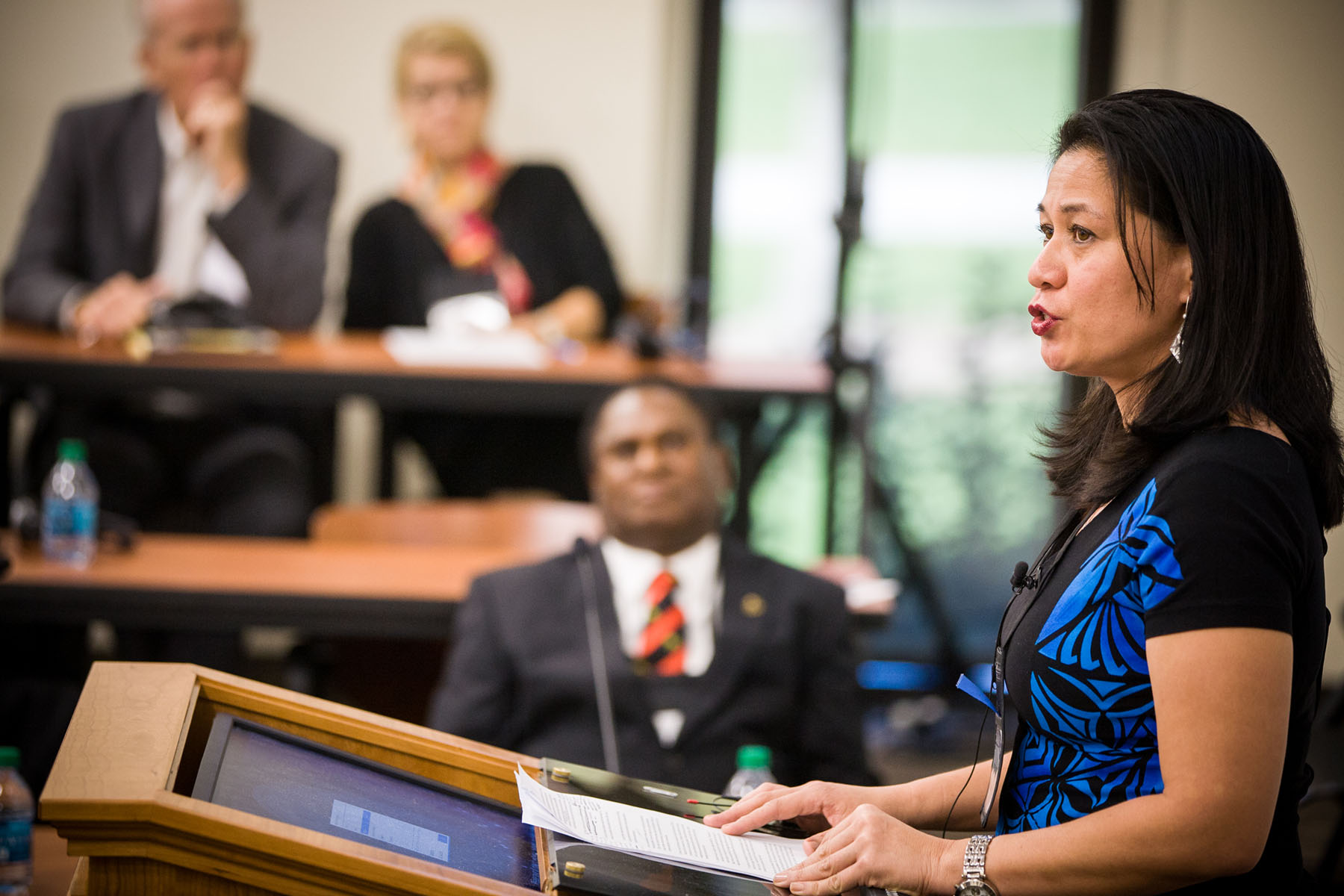
Theresa Potoi; Photo credit: Matt Imbler
by Ryan Hughes
In a session moderated by J. Clifford Wallace, Chief Judge Emeritus of the U.S. Court of Appeals for the Ninth Circuit, Gibuma Salika, from Papua New Guinea, Theresa Potoi, from Samoa, and Francis Hezel, from Guam, discussed the reality of religious liberty in the Pacific Islands and measures being undertaken to protect these freedoms.
Gibuma Salika, Deputy Chief Justice of the National Court and the Supreme Court in Papua New Guinea, discussed the protection of religious freedoms within his own nation. He described how the framers of the constitution... more
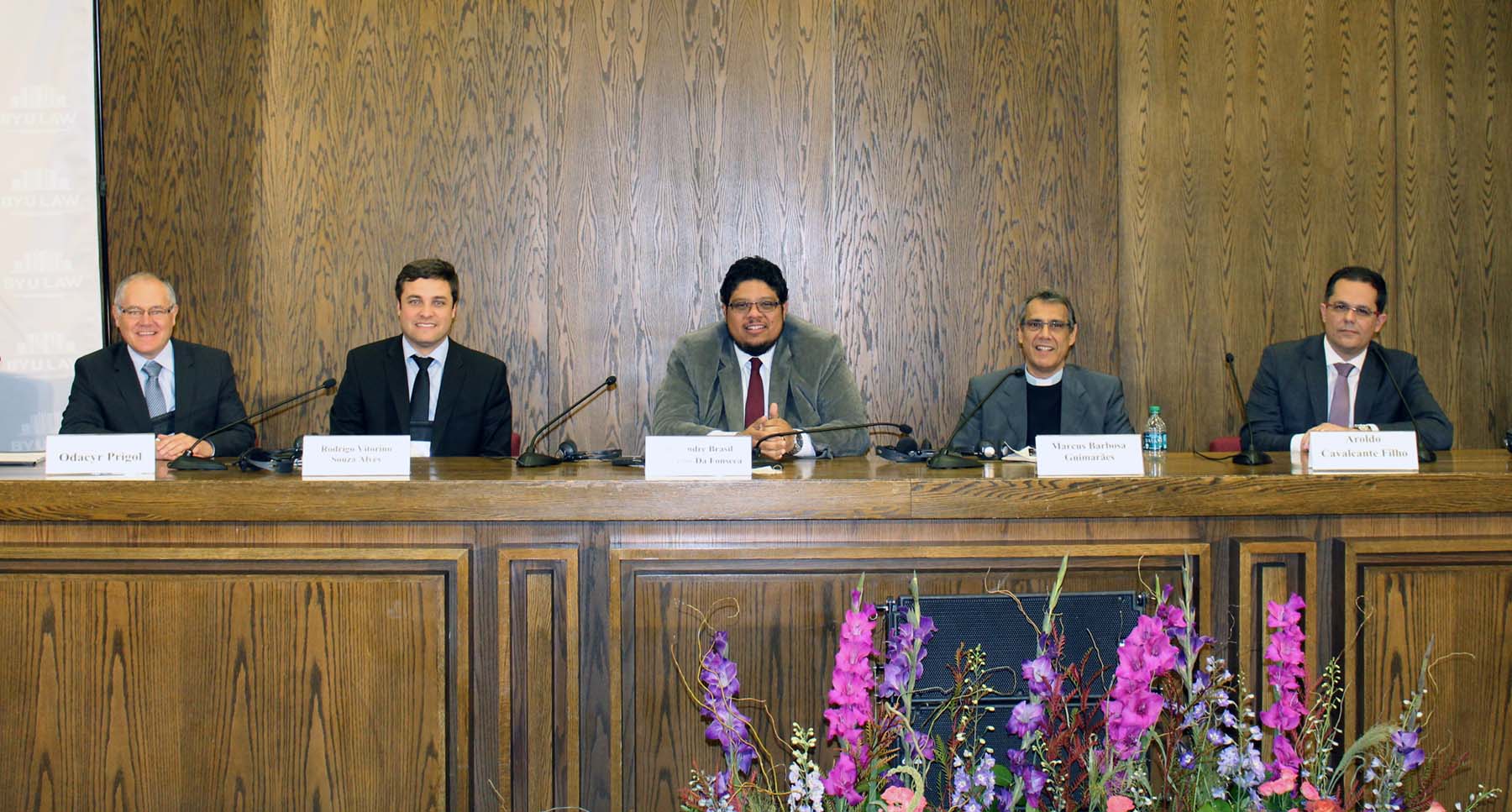
Photo credit: Alex Alton
by Gaylee Coverston
The Brazil session began with the Moderator, Odacyr Prigol, Chair of the Curitiba Chapter of the J. Rueben Clark Law Society and member of the Religious Freedom Commission of the Brazilian Bar Association, who introduced the four Brazilian delegates and the order of their presentations.
The first presenter was Rodrigo Vitorino Souza Alves, Director of the Brazilian Center of Studies in Law and Religion and Professor of Law at the Federal University of Uberlândia in Brazil. Professor Souza began his remarks on the religious diversity in Brazil with a brief summary of the history of religious demographics from the 1970s forward. In the recent years, religious diversity... more
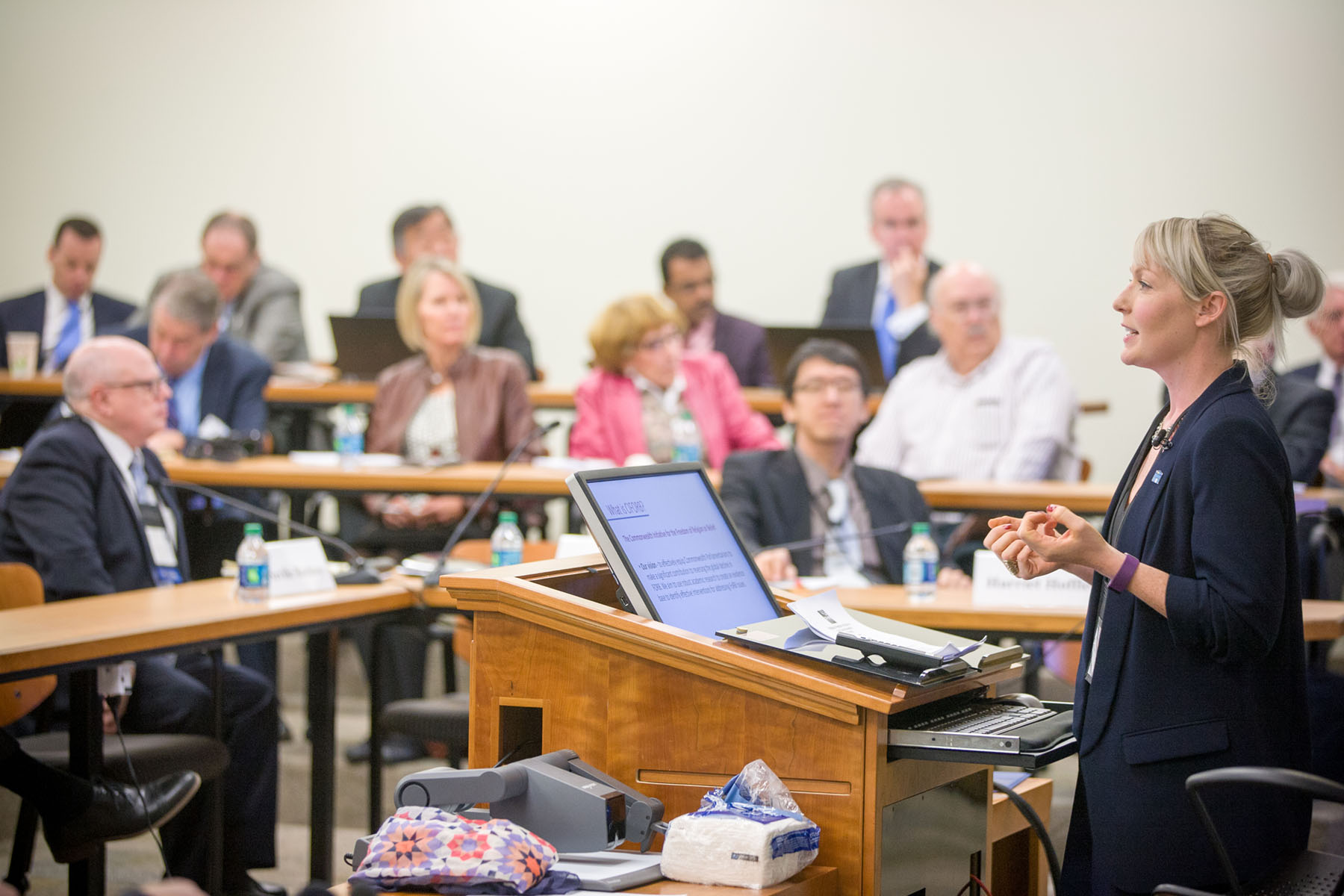
Harriet Hoffler; Photo credit: Matt Imbler
by Jordan Pendergrass
Most breakout sessions at the Symposium are dedicated to a single region or country. One of Tuesday’s sessions, however, took on a much larger project—the entirety of the British Commonwealth. This session was entitled Religious Freedom Initiatives in the British Commonwealth, and speakers included Harriet Hoffler, Research Fellow, Commonwealth Initiative for Freedom of Religion and Belief, University of Birmingham, United Kingdom, and Joshua Neoh, Lecturer, Australian National University College of Law. The proceedings were moderated by Neville Rochow, Barrister, Australia and European Union Government Relations Representative, European Union Office of The... more
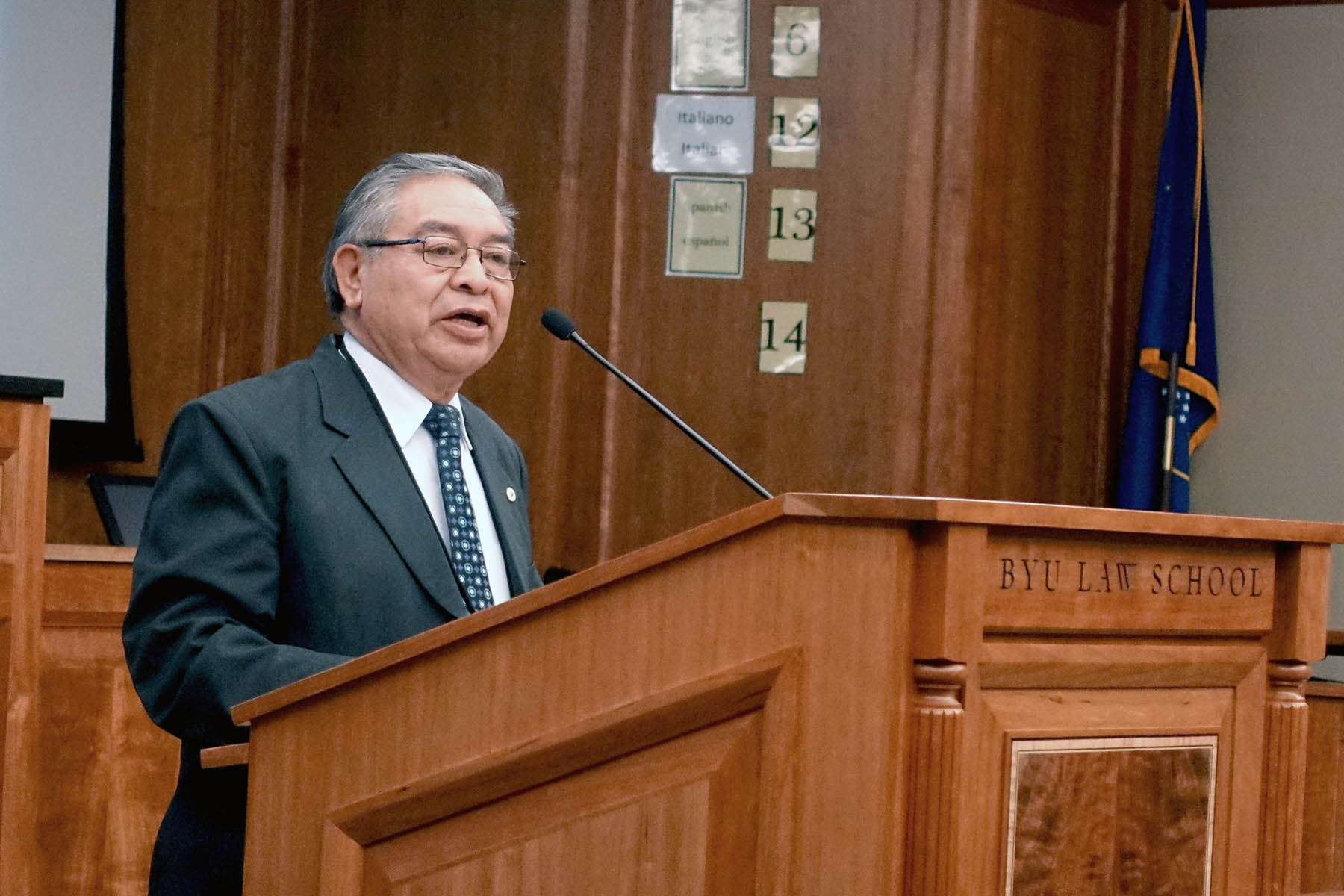
César Osmundo Vásquez Miranda; Photo credit: Page Johnson
by Jeremy Driggs
The session on Central America was moderated by Mark Wood, International Fellow, International Center for Law and Religion Studies. Panelists were César Osmundo Vásquez Miranda, President of the Evangelical Alliance of Guatemala, and Juan Alfonso Fuentes Soria, Former Vice President of Guatemala from 2015-2016, and Secretary General of the Central American University High Council.
César Vásquez Miranda spoke about how religion is being oppressed in all spheres of public life. A cloud of darkness blocks and impedes the army of religious freedom. This, according to him, is secularism, humanism, and atheism. These forces are testing religious... more
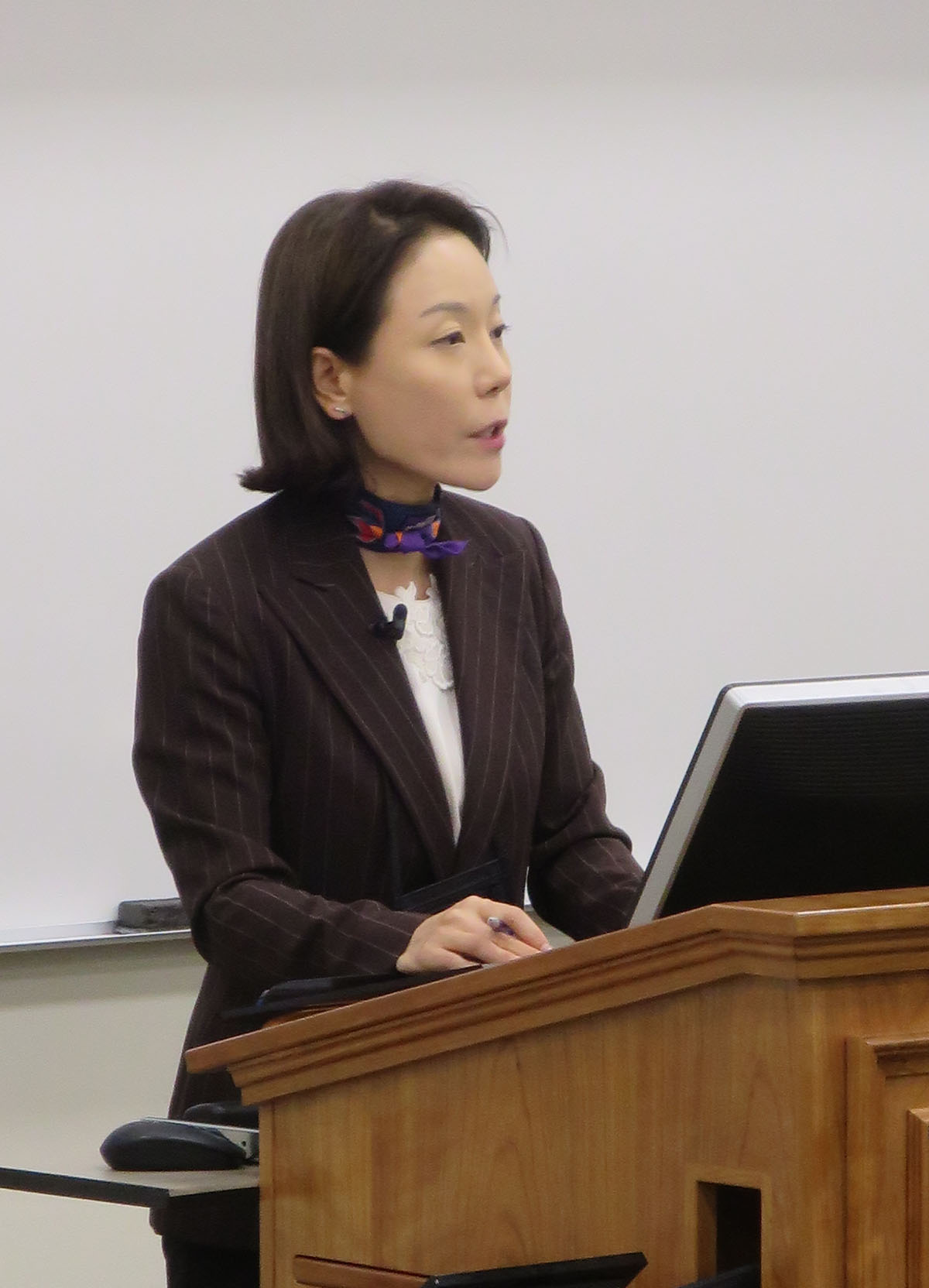
Doo Ah Lee
by Yangzi Jin
Victor A. Taylor, International Fellow for the International Center for Law and Religion Studies, moderated the Korea and Japan session. Panelists were Aki Kitazawa, Professor of Private International Law, Keio University, Japan, and Doo Ah Lee, an attorney at law with Vision International Law Firm in South Korea.
Professor Aki Kitazawa talked about private international law, which regulates cross border legal issues concerning individual corporations, marriage and divorce, and international transactions. She talked about legal cases involving religious freedom issues.
Professor Kitazawa gave examples of international marriage. In general, marriage is governed by the civil code regulating marriage for its nationals. The country that establishes the civil code may specify the governing law. For example, the Japanese Private International Law (JPIL) says that the governing law is the civil code in the country. She then explained the application of law in countries... more
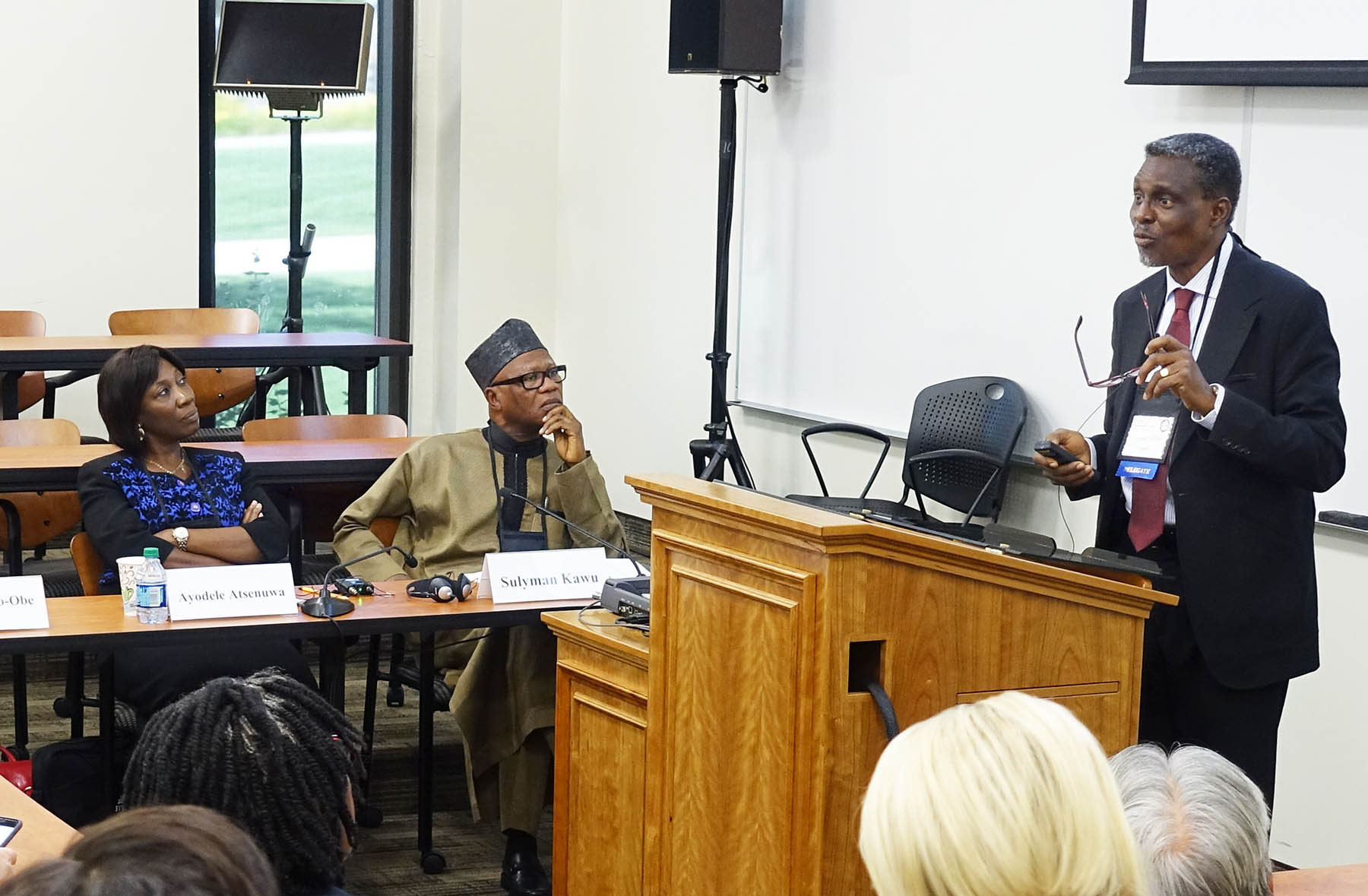
Photo Credit: Page Johnson
by Ryan Hughes
In a session moderated by Christine Hurt, Associate Dean and Professor of Law at J. Reuben Clark Law School, Sulyman Kawu, Ayodele Atsenuwa, and Akin Ibidapo-Obe, all from Nigeria, discussed the realities of religious liberty in Nigeria, the problems facing it, and what is being done to strengthen these vital freedoms.
Sulyman Kawu, Chief Judge at the Kwara State Judiciary, discussed the religious pluralism that exists in Nigeria today and how that is an improvement over past decades. He talked about how the state actively supports both Muslims and Christians... more
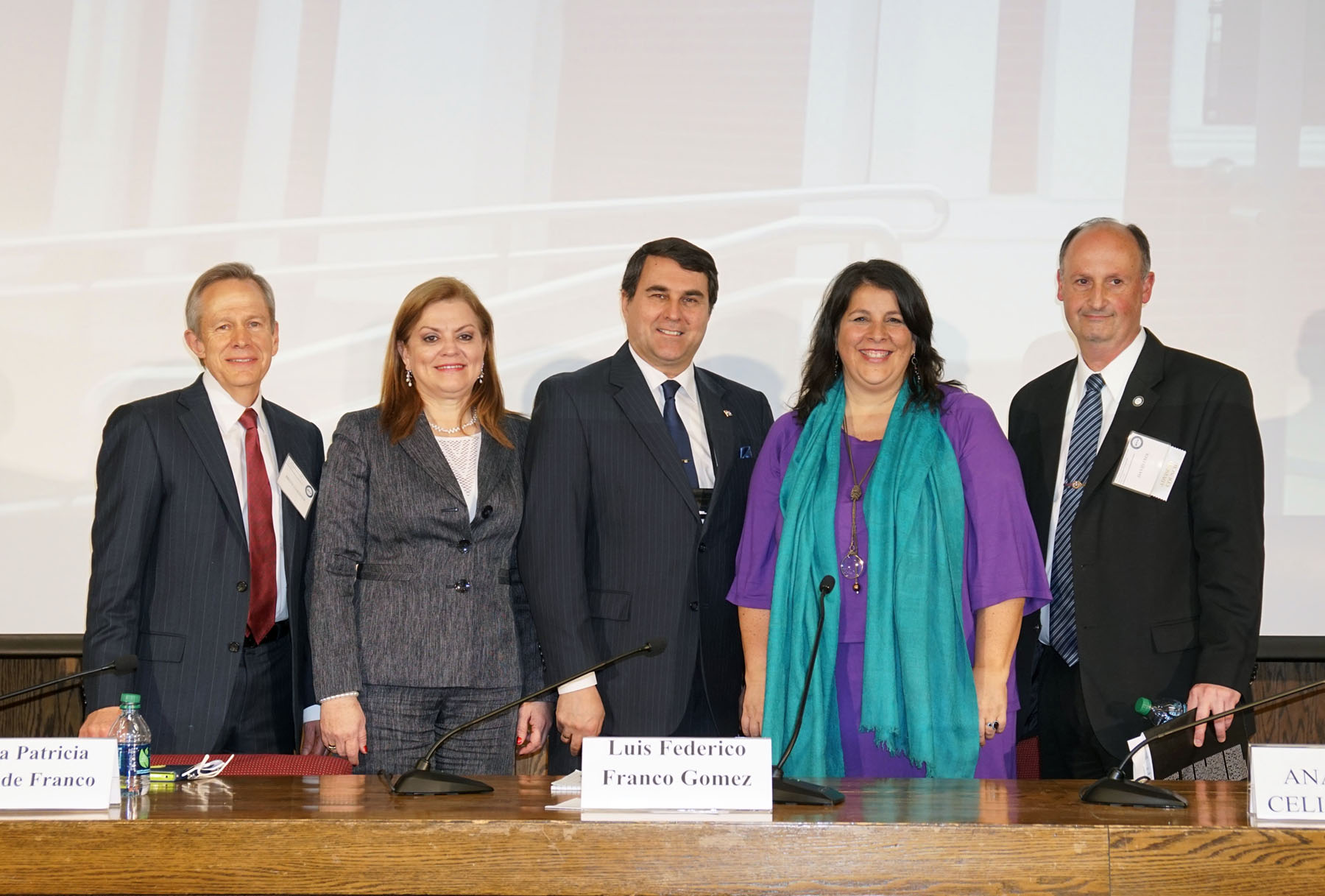
Photo credit: Dave Christensen
by Gaylee Coverston
Brent Gardner, International Fellow for the International Center for Law and Religion Studies acted as the moderator for this session. The delegates were Emília Patrícia Alfaro de Franco, and her husband Luis Federico Franco Gomez, Ana Maria Celia Brunet and David Frol.
Emília Patrícia Alfaro de Franco, National Senator of Paraguay, Vice President of the Association of American Women Politicians and the Latin-American Parliament, President of the Commission on Audit and Control, Vice President of the Commission on Equity and Gender and parliamentary secretary, began the session. She stated that she was here to discuss religious freedom... more
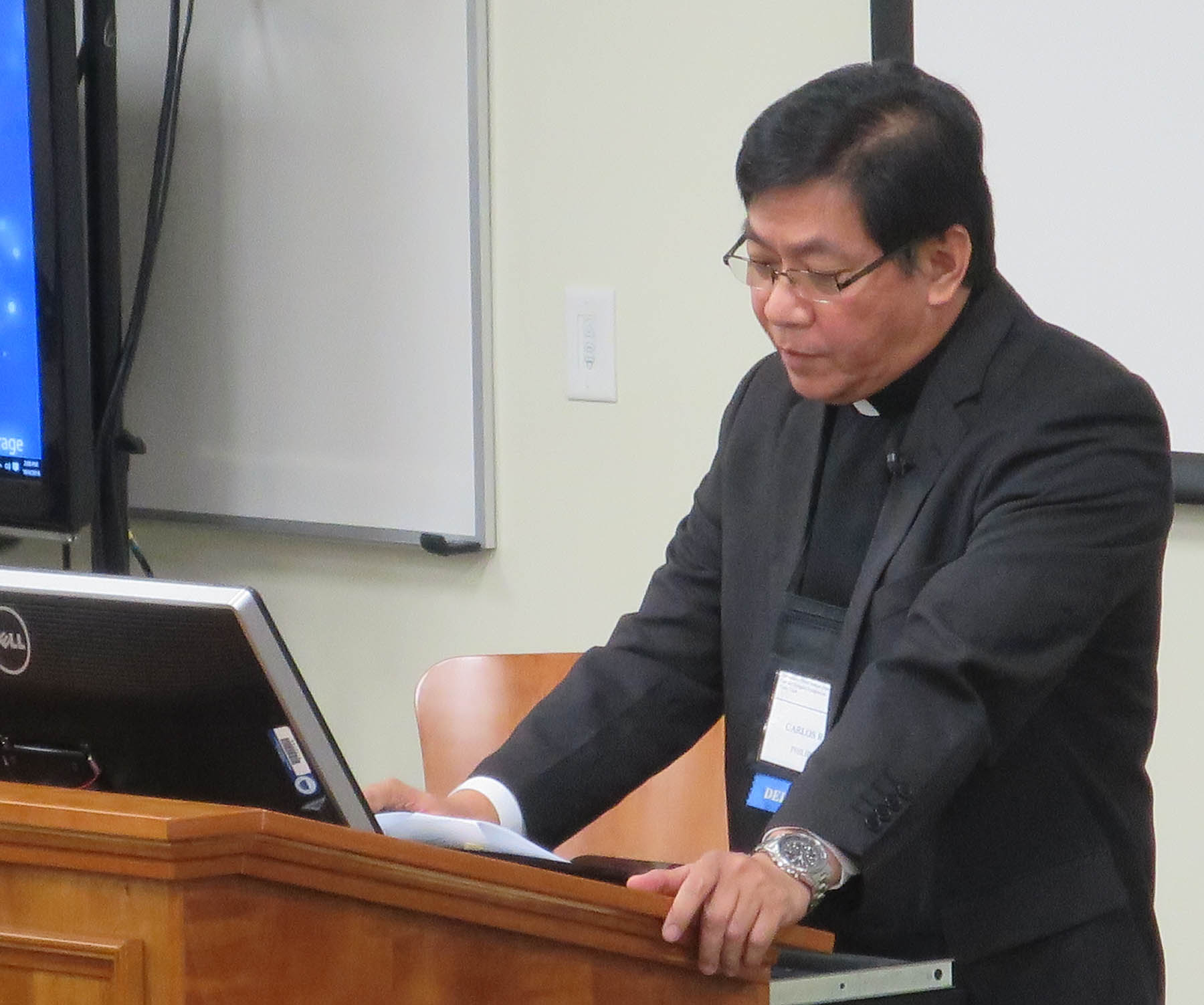
Carlos V. Reyes
The session titled Interreligious Cooperation, Religious Rights, and Pluralism 2 was moderated by J.B. Haws, Assistant Professor of Religious Education at Brigham Young University. The panel consisted of Carlos V. Reyes, Executive Secretary of the Episcopal Commission on Interreligious Dialogue and the Catholic Bishops Conference of the Philippines; Gerald Filson, Director of Public Affairs of the Baha'i Community of Canada; Jeremy Raymond Stuparich, Public Policy Director of the Australian Catholic Bishops Conference; and Kieran Walton, Private Secretary to the Archbishop of Sydney, Australia.
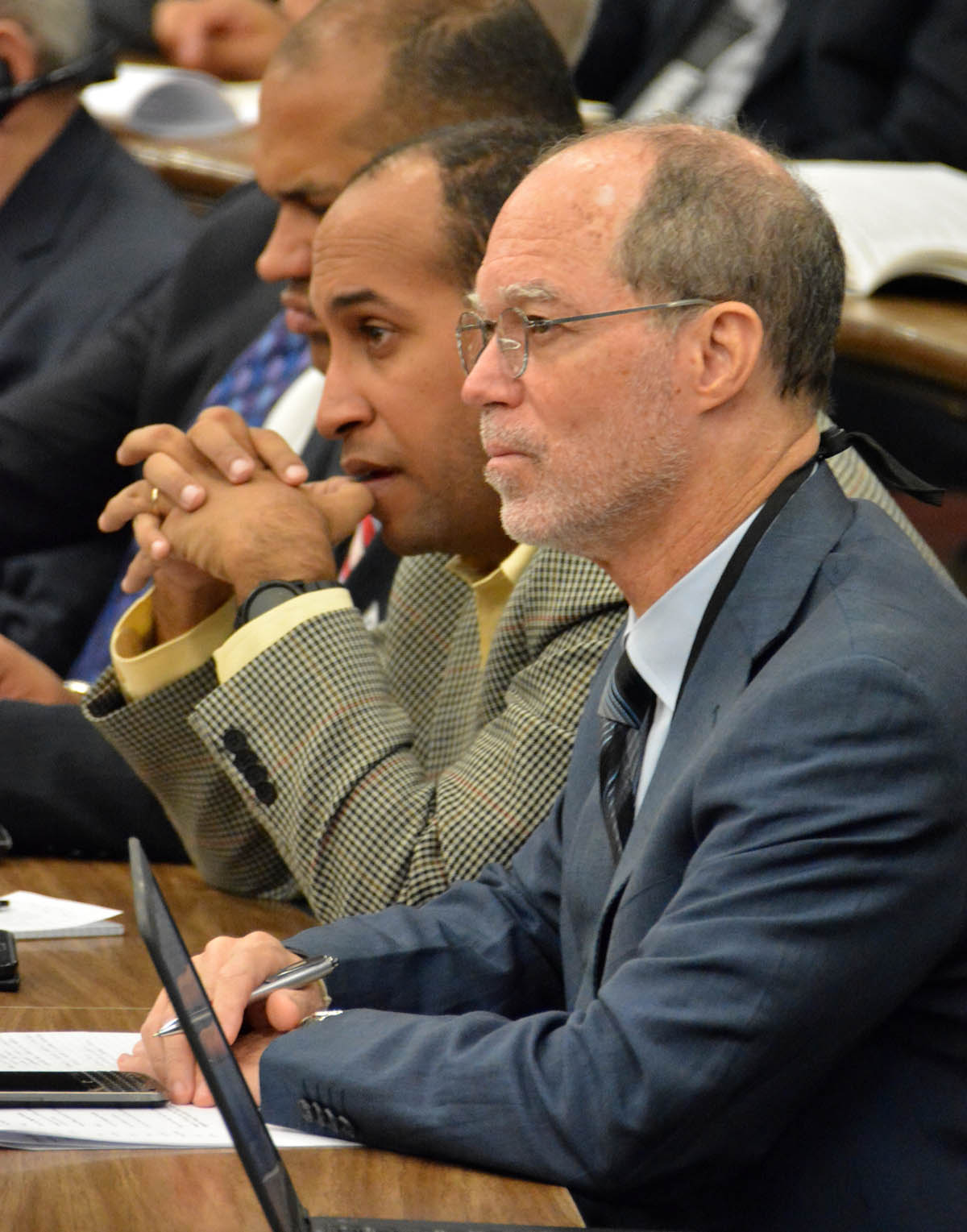
Rafael Paz and Christian de Lespinasse; Photo credit: Brent Belnap
by Lauren Flores
Greg Clark, International Fellow for the International Center for Law and Religion Studies, served as a moderator for a panel on the status of law and religion in the Caribbean. Speaking at the session were Jean Marie Christian de Lespinasse from Haiti and Rafael B. Paz from the Dominican Republic. Each individual spoke on the importance of religious freedom in their home countries.
Jean Marie Christian de Lespinasse, a lawyer from the Cabinet de Lespinasse spoke of the great opportunity Haiti has to expand their laws to address religious freedom. He explained that in Haiti there is not much that has been done, and that the greatest challenge will be to organize an interfaith coalition. He spoke to the fact that Haiti as a nation has so many other needs that are seen as more pressing for the government to address. He also explained that there are grey areas as to what is considered a religion. Haiti has indigenous groups that have some ties to spiritual beliefs, but it is still to be determined whether practices... more
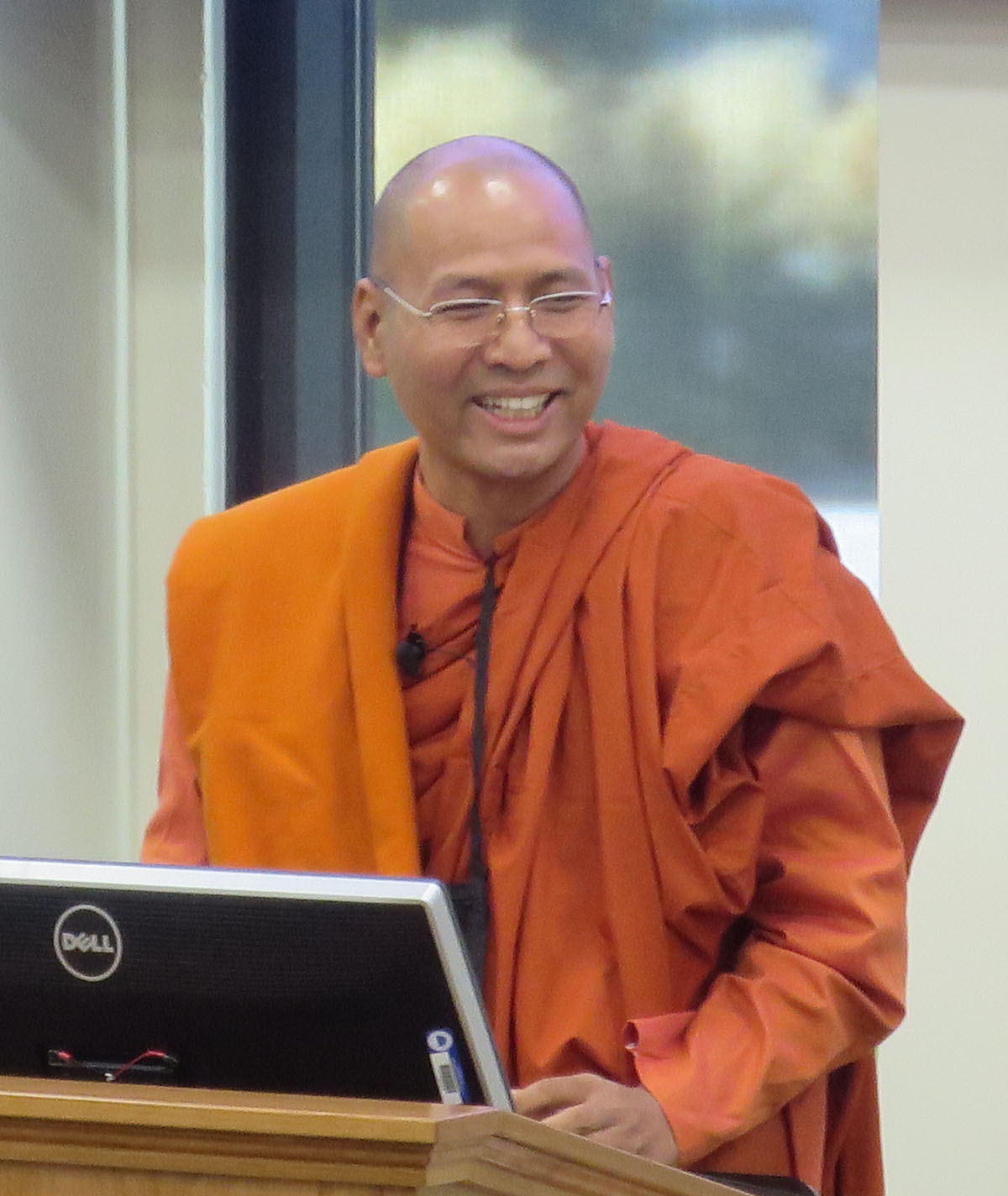
Thondara
by Ryan Hughes
In a session moderated by Brett Scharffs, Professor of Law and Director for the International Center for Law and Religion Studies at the J. Reuben Clark Law School, Mahn Palmerston, Ashin Thondara, and Ashin Visuta, who are all from Myanmar, discussed how interfaith cooperation is taking place in the state and how religious liberties are being upheld.
Reverend Mahn Palmerston, General Secretary of the Myanmar Council of Churches, described the religious plurality and religious freedom movements currently taking place in Myanmar. He listed four different points. First, he suggested that technology has not reduced interreligious conflict. If anything, it has allowed it to increase because “although we are living in the IT age, brutal events in the world prove that... more
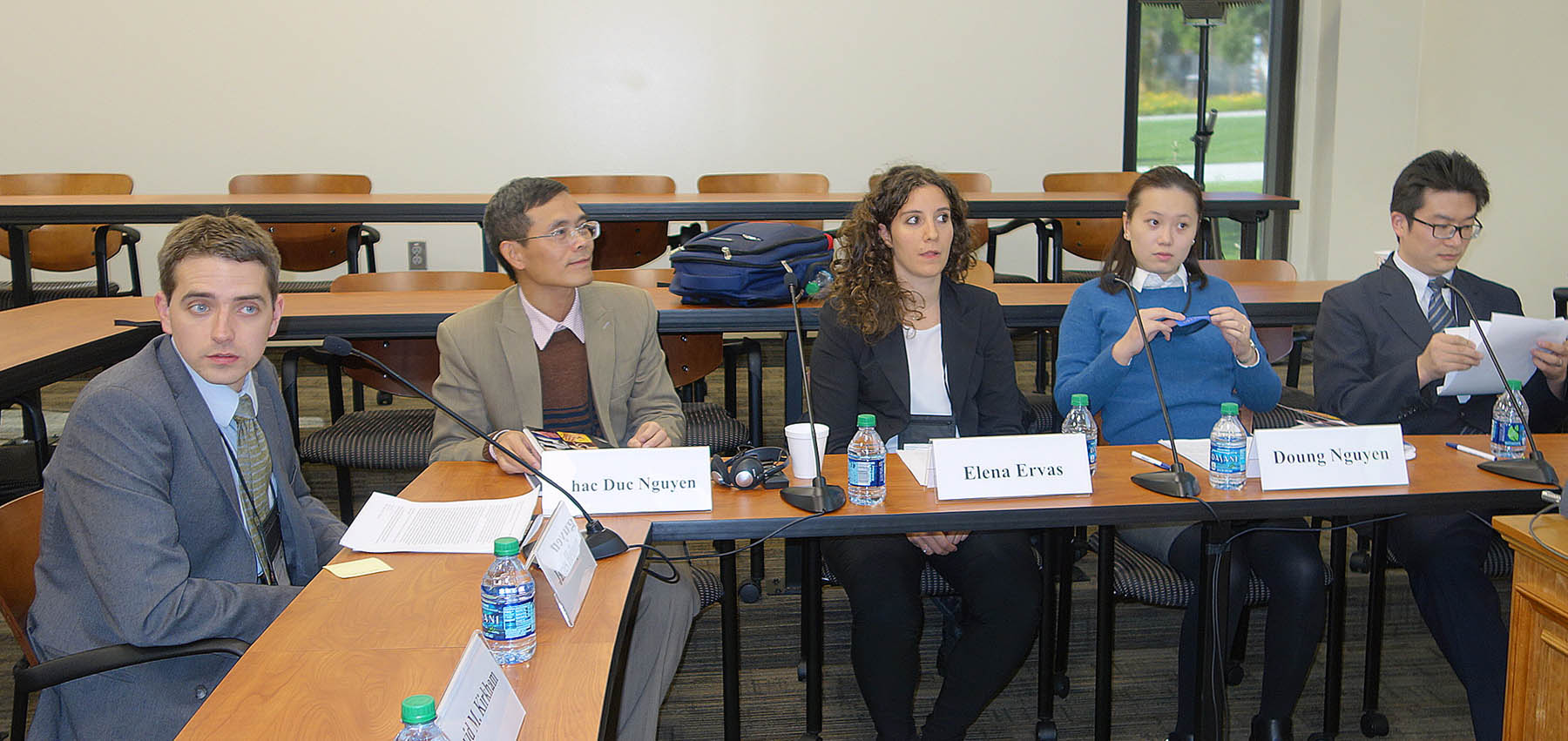
Photo credit: Page Johnson
by Page Johnson
The BYU Law and Religion Symposium provides an opportunity for rising young scholars to present their research on a topic related to Symposium issues. David Kirkham, Academic Director of the BYU London Centre and a Senior fellow at the BYU International Center for Law and Religion, welcomed this year’s students from China, Italy, Vietnam, and America with a bit of hopeful irony: “These are the people who are the future. They are the ones who will solve all the problems my generation has left them.”
The first young scholar to present was Cheng Hongmeng, Postdoctoral Fellow, Fudan University, China. His presentation was titled “Religious Freedom is the... more
